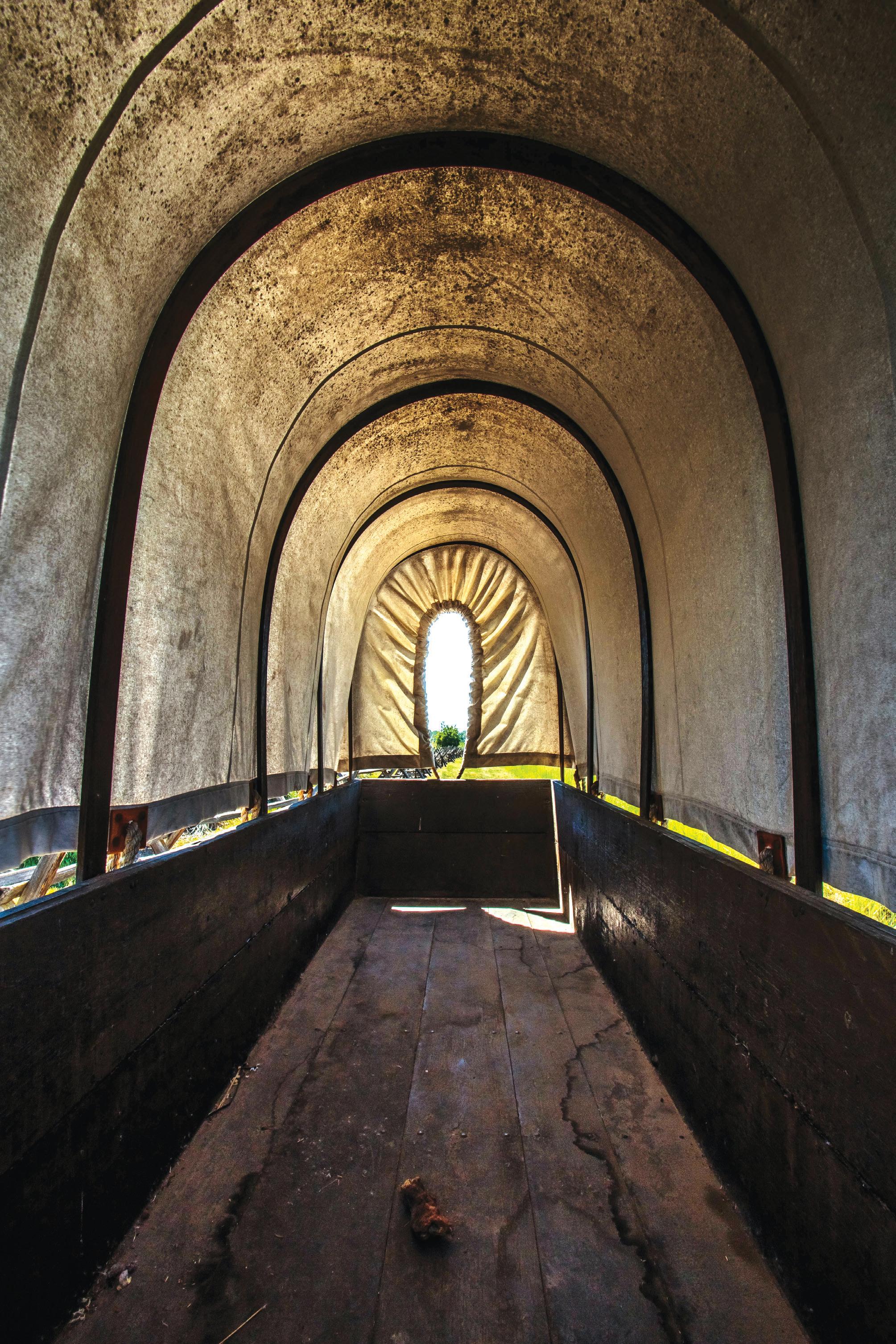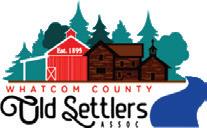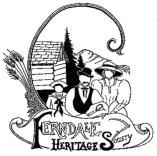



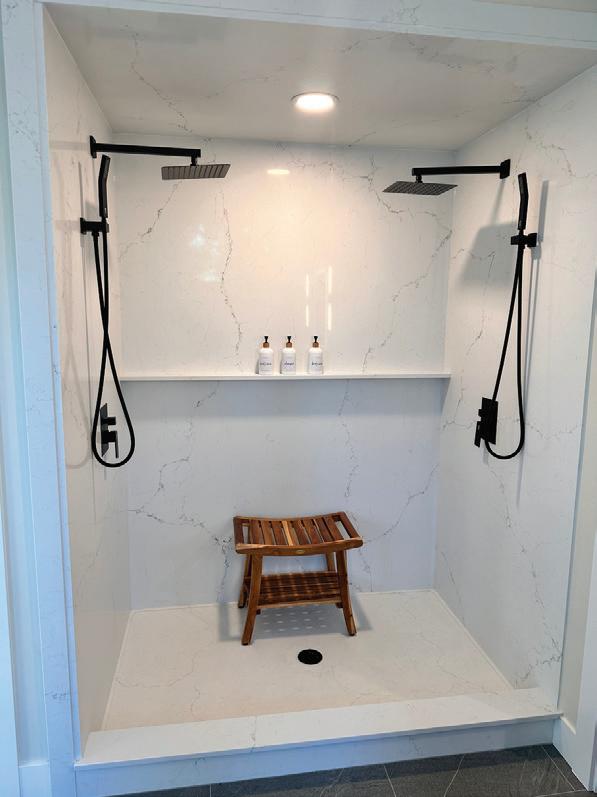





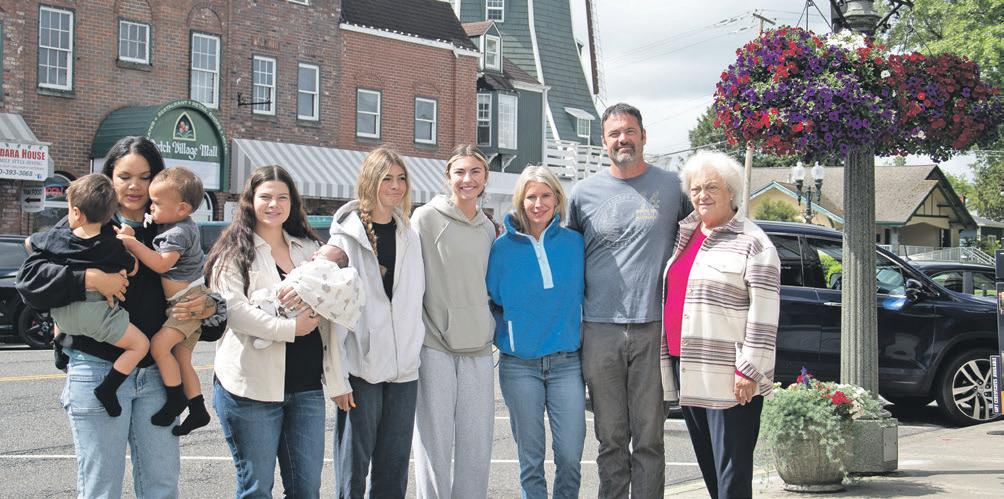
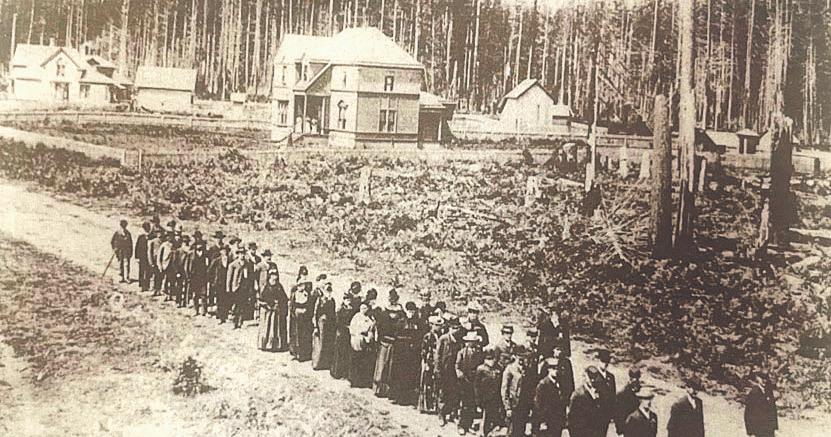
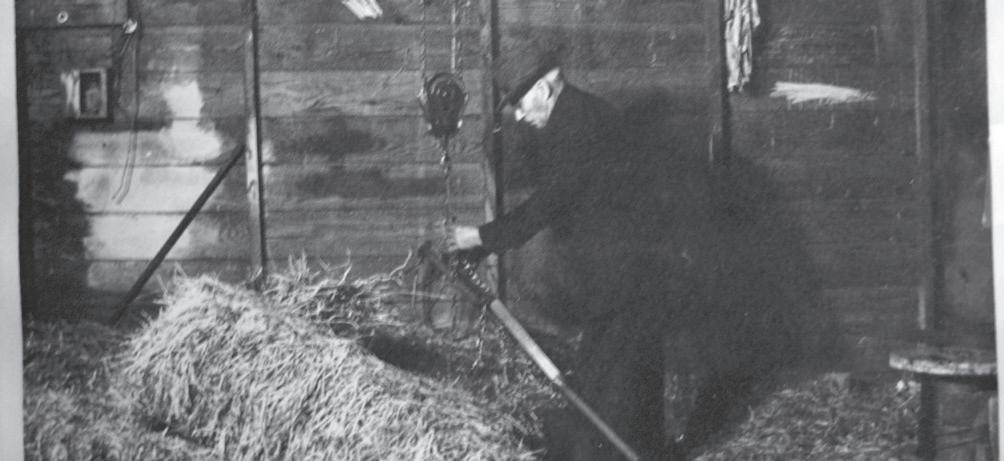
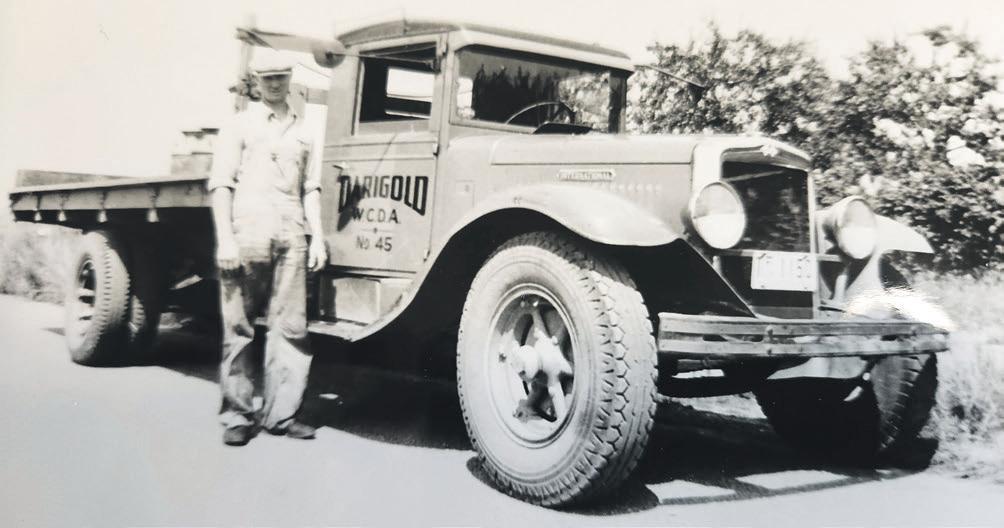
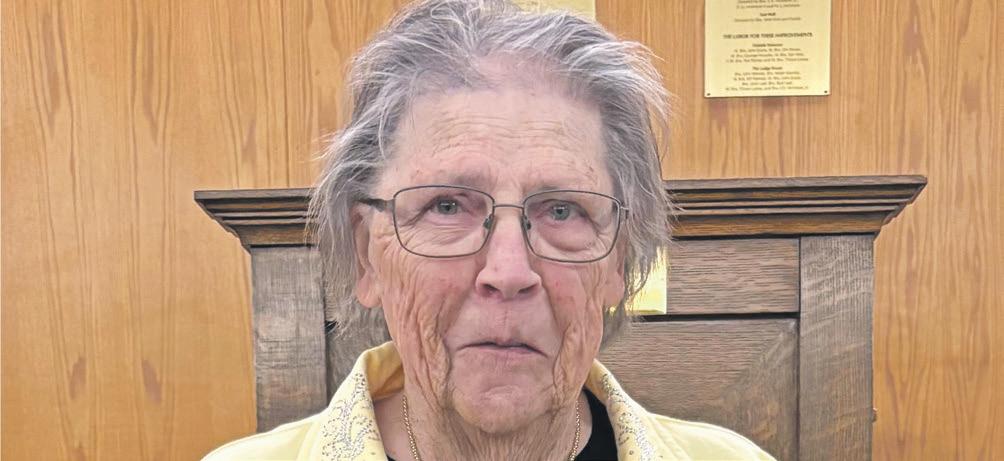


















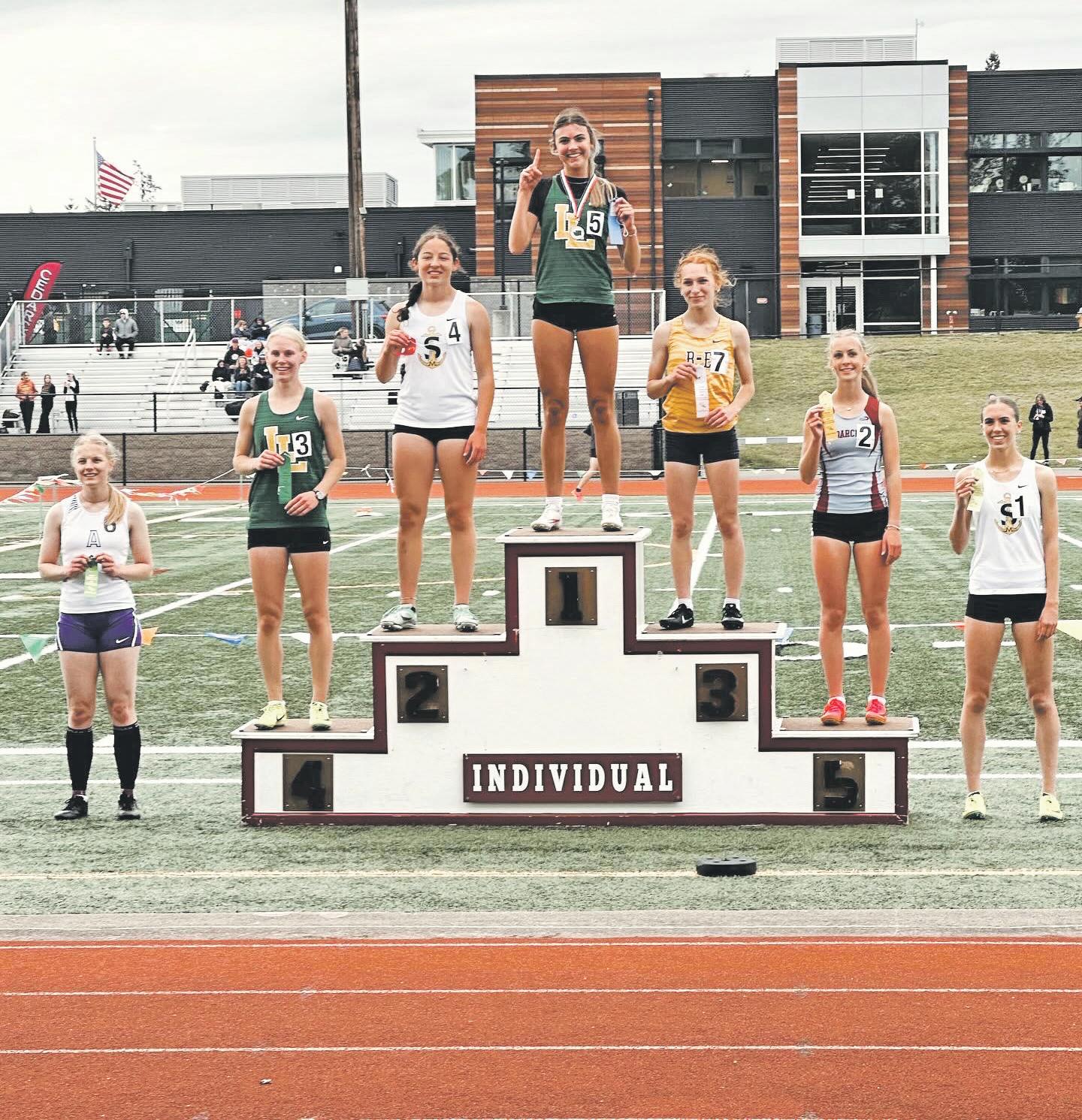
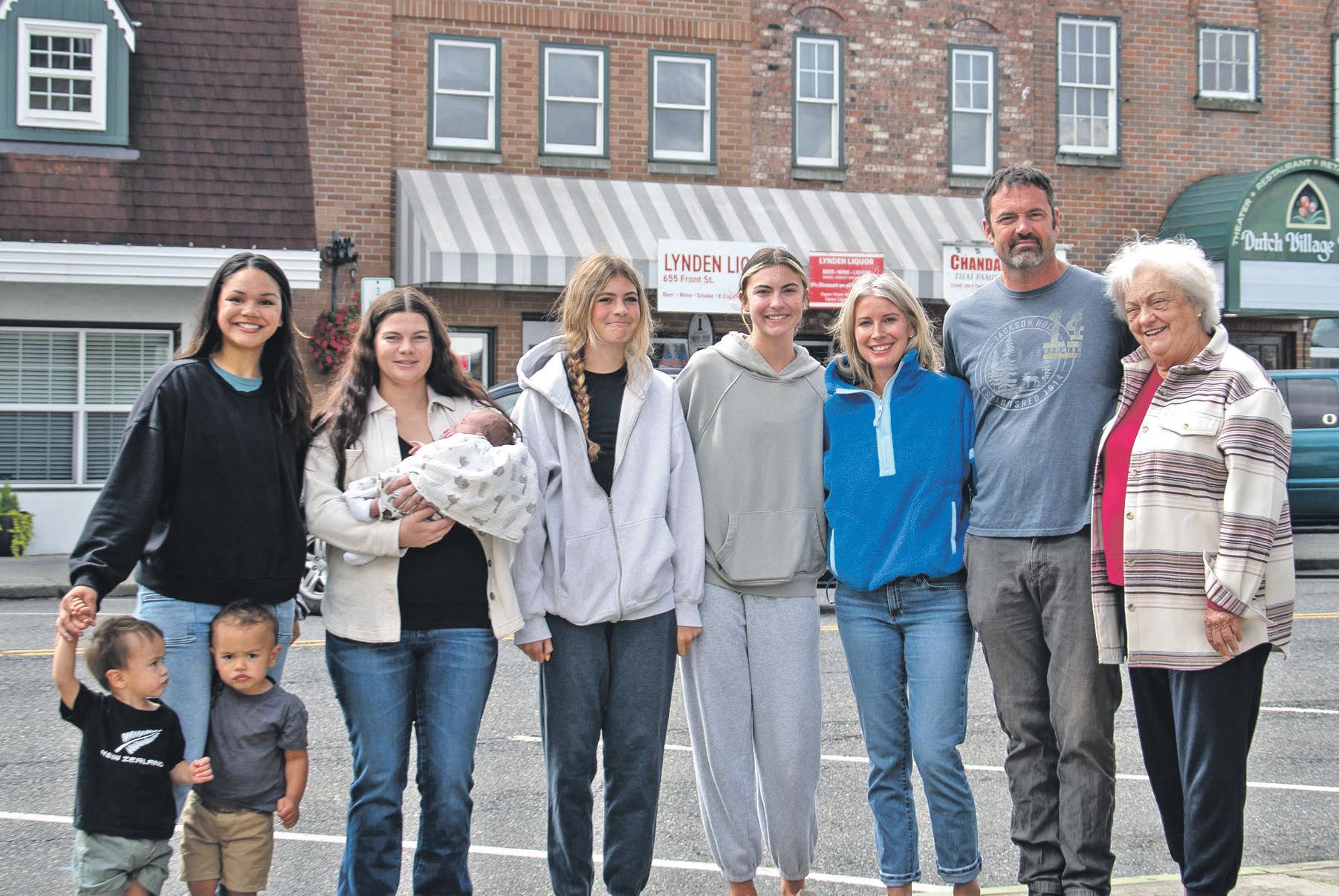

By Joe Kramer Sports Editor
For more than a century, the VanBrocklin family has called Whatcom County home. In that time, their name has become intertwined with local sports.
That legacy has been forged in high school gyms, college arenas and even professional courts overseas.
“I couldn’t track exactly what first brought our family here,” Jackie VanBrocklin said. “But the VanBrocklins have been in the area for over 100 years.”
A Lynden resident, Jackie VanBrocklin is mother of Faith and Presley VanBrocklin.
The family’s roots in the community run deep. Jackie said it’s a combination of generational ties, love for the community and the sense of belonging that has kept the VanBrocklins in Whatcom County for so long.
“We love the proximity to the mountains and ocean,” she wrote. “Most of us have stayed in the area because this is home.”
But beyond simply living here, the VanBrocklins have left a lasting mark on local athletics.
For more than three decades, at least one VanBrocklin woman has competed in sports at either Mount Baker or Lynden High School.
From basketball and volleyball to track and field, soccer and wrestling, the family has remained a steady presence in the North Whatcom sports scene.
Each member of the VanBrocklin family has carved out their own chapter in that legacy.
Heidi VanBrocklin, starred at Mount Baker High School, played point guard at Western Washington University under
See VanBrocklin on next page
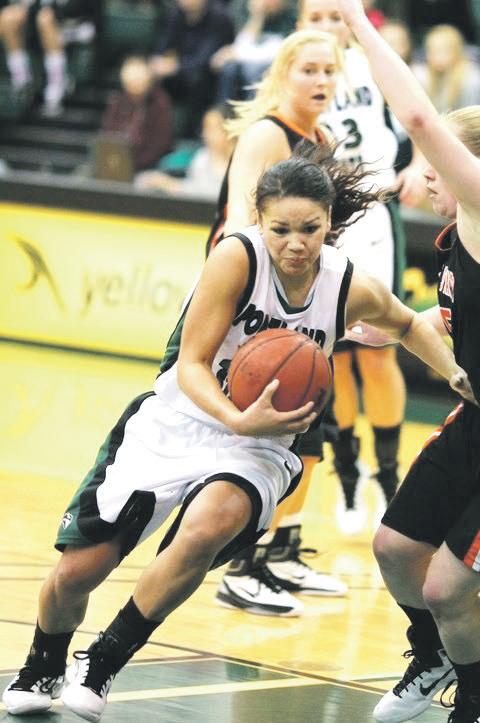
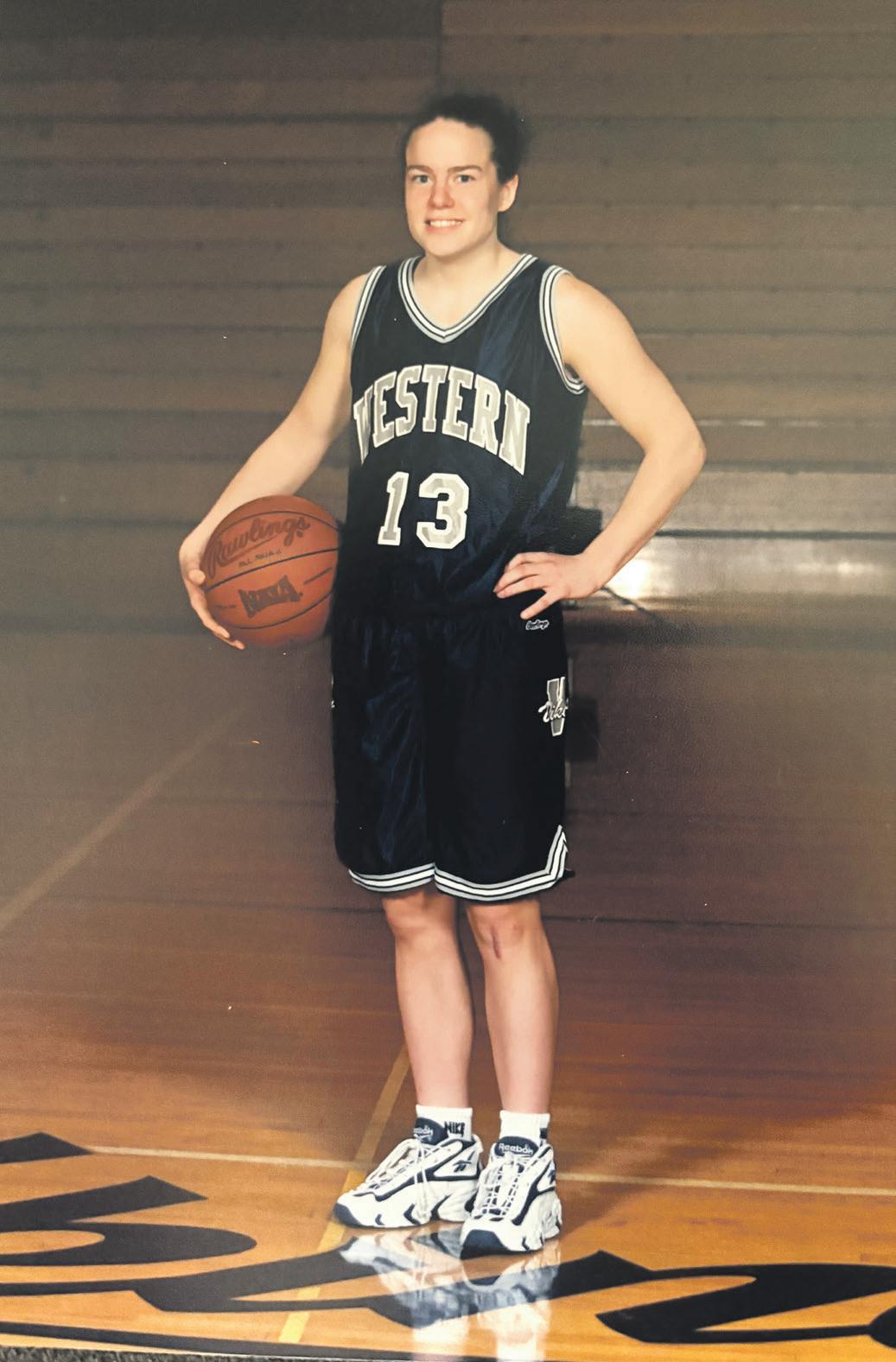

current head coach Carmen Dolfo and went on to play professionally in Australia.
Tori VanBrocklin, also a Mount Baker alum, played basketball and volleyball in high school before continuing her basketball career at Lower Columbia College and Eastern Oregon University.
Whitney VanBrocklin competed in basketball and volleyball at Mount Baker and played basketball at Northwest Nazarene University in Nampa, Idaho.
Courtney VanBrocklin, another Mount Baker graduate, played basketball and volleyball in high school and continued her basketball career at Boise State University and finished at Portland State University.
Faith VanBrocklin, representing Lynden High School, became a four-time district champion in track and field in the 300-meter hurdles. She won a state title in the
300-meter hurdles and still holds Lynden High records in both the 300- and 100-meter hurdles.
“The best lessons and values the members of our family have learned are the importance of teamwork, the value of a strong work ethic, grit and determination, and just how important and life-changing the ability to compete both in high school and college can be,” Jackie said.
For the women who con-
tinued on to college athletics, Jackie said the opportunity wasn’t just about sports — it opened doors to broader experiences and education.
“It was an incredible opportunity to have their education paid for and open their eyes to the world around them,” she said. “Between high school and college they played all over the United States and Australia.”
While all the VanBrocklins have added to the family’s
reputation, there’s no doubt Heidi set the tone for those who followed, according to the family.
Younger sister Whitney recalled realizing just how much of a local star her oldest sister had become.
“I remember in elementary school beginning to understand just how good of a player my oldest sister Heidi was,” Whitney wrote. “The sixth-grade teacher at our elementary school used to cut out the articles about her games, underline her stats and laminate them for us.”
Heidi’s reputation extended well beyond school walls — sometimes in unexpected ways.
Years ago, Whitney, Heidi and their sister Tori were returning from a trip to Canada with their mother.
As they reached the Sumas border crossing, Whitney re-

alized she had forgotten her passport.
“We were all really nervous about getting back across without it,” Whitney said. “When we pulled up to the guard, we handed him the passports. He was flipping through them and noticed I didn’t have mine. As he mentioned something about it, he changed tack and said, ‘Heidi VanBrocklin? Like the legendary point guard from Mount Baker High School?’”
Heidi confirmed it was her, and the border guard let them through.
“She was kind of a legend in Whatcom County basketball,” Whitney wrote.
The VanBrocklin story isn’t only about personal achievements — it’s also about community connections and giving back.
“Like many families, sports and competition are a huge
part of who we are and have evolved as we’ve gotten older,” Jackie said. “We used to play basketball against each other, go for runs or work out when we got together. Now it’s going for hikes, watching the younger kids play, talking sports.”
Beyond family gatherings, several VanBrocklins have stepped into coaching and mentoring roles. Nick VanBrocklin, along with his wife Jackie, have coached multiple sports during their children’s athletic careers.
Most recently, Nick coached his youngest daughter Presley’s AAU basketball team.
Over the years, local coaches and community figures have also played pivotal roles in shaping the family’s journey. Heidi and Tori credited longtime basketball coach Jim Freeman, while Whitney
pointed to Ron Lepper as instrumental in her high school career and pursuit of college basketball.
Faith VanBrocklin also highlighted Layne Hutchins for supporting her and encouraging her to try new things.
Though the county’s sports landscape has changed over the decades, the VanBrocklins’ presence has remained constant—as has their passion for athletics and the deep community ties that have kept them in Whatcom County.
“There’s been a VanBrocklin woman competing in sports here for over 30 years,” Jackie said. “It’s just who we are.”
As for any connection to Norm VanBrocklin, the former NFL quarterback and Pro Football Hall of Famer, Jackie confirmed simply: “Yes, he is a distant cousin.”

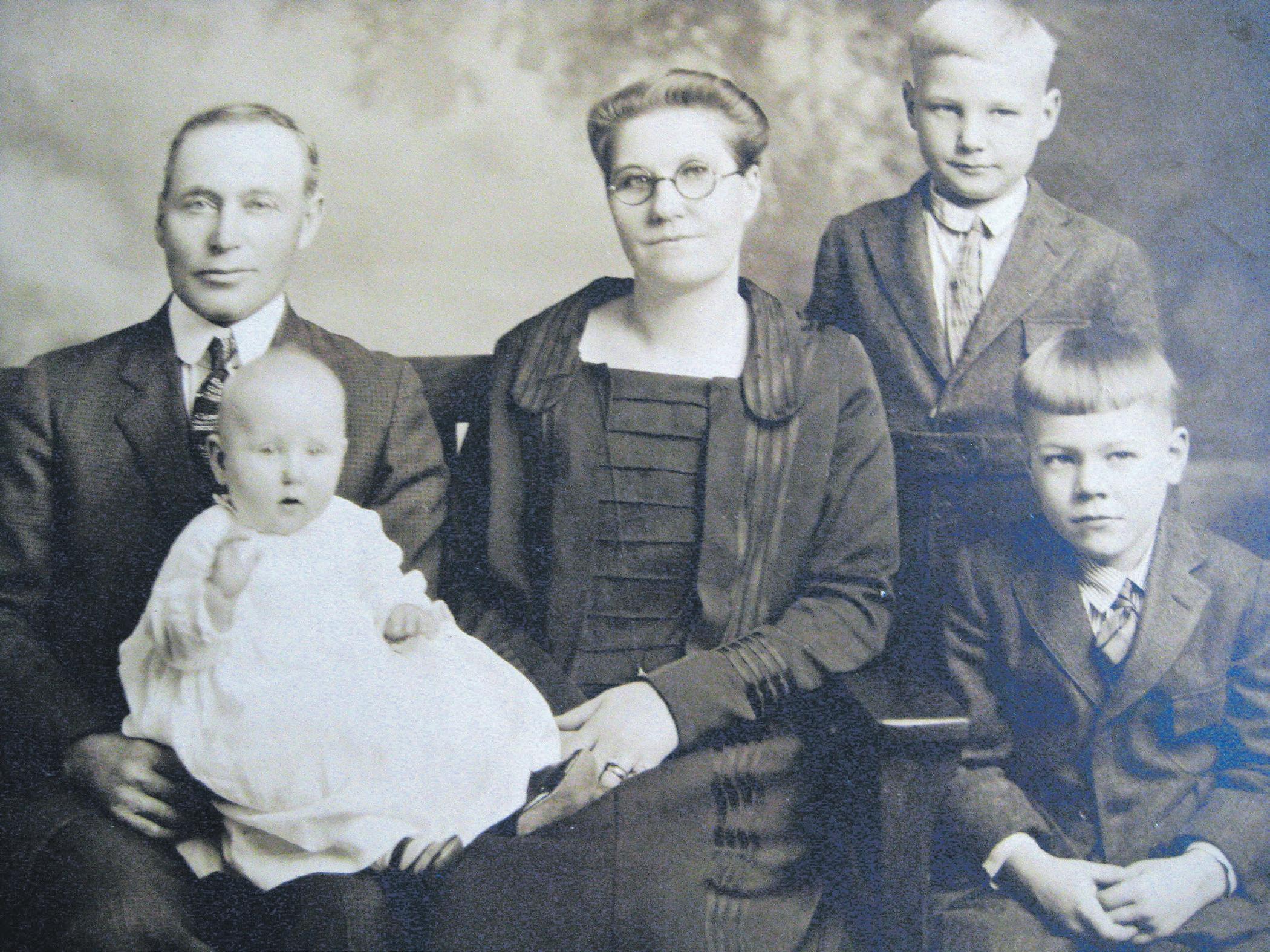
By Racquel Muncy Staff Reporter
The City of Ferndale has a long history of entrepreneurial spirit and the logging industry.
Although the first settler arrived in 1859, it was 1873 before the first Anglo settler arrived and settled upriver.
In 1877 Big Jam, an ancient log jam in the Nooksack River, was cleared and the number of settlers that moved north increased tremendously and the age of the steamboat came around.
By 1900, sawmills were found up and down the Nooksack River, with Ferndale being recognized as a center for the industry. Not long after dairy and agriculture began to boom as Swedish immigrants

Doris sits for a family portrait with her parents August and Edith Pehrson and her two brothers. (Photo courtesy Robertson family)
and missionaries continued to move west from Iowa and Kansas.
It is in this time that Doug Robertson starts his family history. The Pehrson sawmill, where the post office now stands, is a big part of his history.
His maternal grandfather August Pehrson owned the mill. He was filled with ideas.
“He was a bit of an inventor,” Doug said.
One such invention was a claw that was able to grab hay bales and place them into the loft. Another invention chopped firewood, but the device worked so fast it was unsafe and flew everywhere, according to Doug.
On his dad’s side, Olaf was born in 1887 in Norway and found his way to Ferndale.
In 1921, he married Nellie Ness. Nellie was born in Minnesota in 1900 and moved to Ferndale in 1908, one year after Ferndale was officially incorporated.
Before Nellie’s passing in 1993, Doug said he took the opportunity to have his grandmother tell her story in her own words and have it recorded.
She said her family moved to Ferndale shortly before her eighth birthday in June. They lived in a small shack outside of the Pehrson mill for the first winter until they could rent a house.
“It was very cold that first winter, the ice and snow,” Nellie said in the recording. “It was a very hard winter.”
She said her parents were later able to buy three acres of land north of Ferndale and built a two-room house.
“Later on they added to it,” Nellie said.
Nellie fondly remembers her childhood.
“I was very full of life,” Nellie said. “I was always running and jumping.”
It wasn’t all easy going, though. She said she remembers the 1909 floods that hit Ferndale and destroyed several buildings. She said she remembered Central School where she went to school flooding and people going out in boats.
“We’ve had many floods, but not any as severe as that one I think through the years,” she said.
Over the years Nellie saw a lot of change.
“I remember when we came to Ferndale there were seven churches and seven saloons,” she said.
Around 1912 she said she remembered someone in Ferndale getting the first car for the area.
In 1917, her parents decided they needed
See Robertson on next page
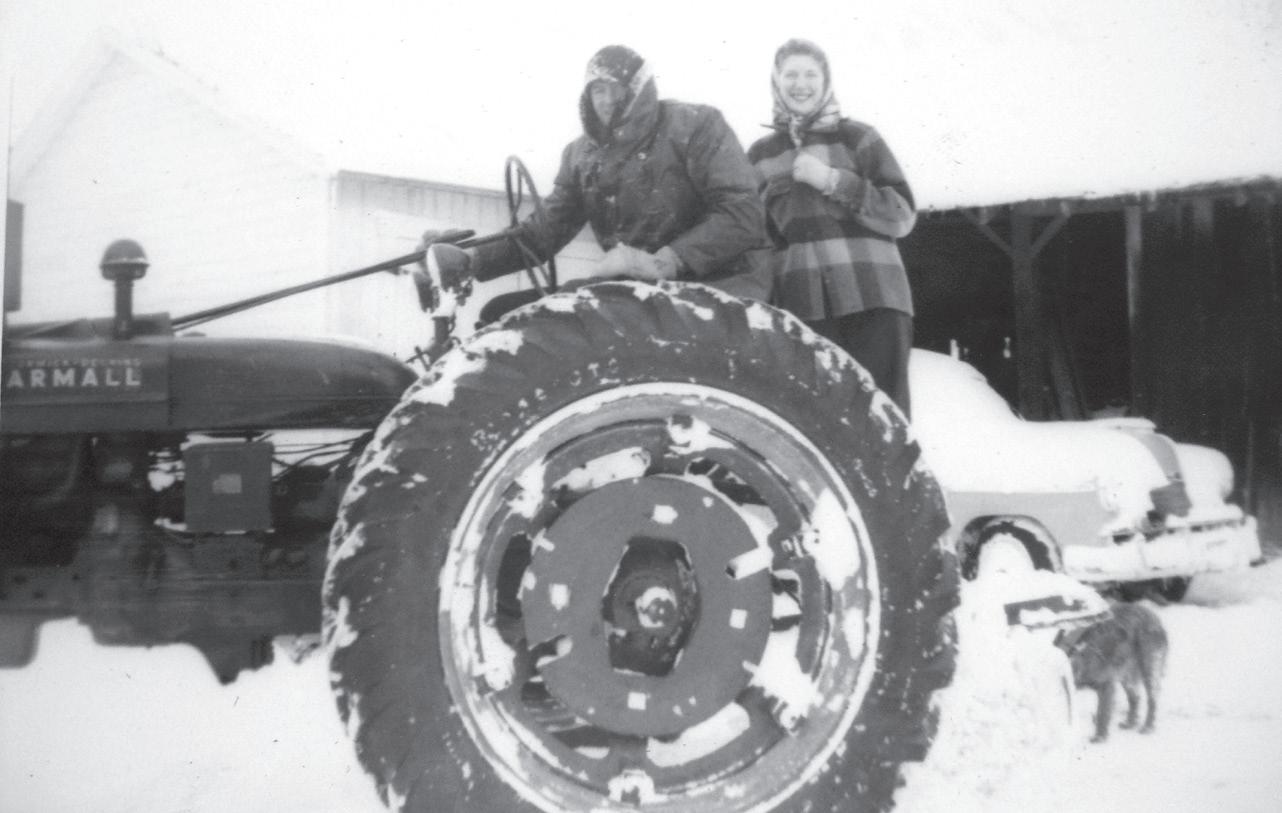
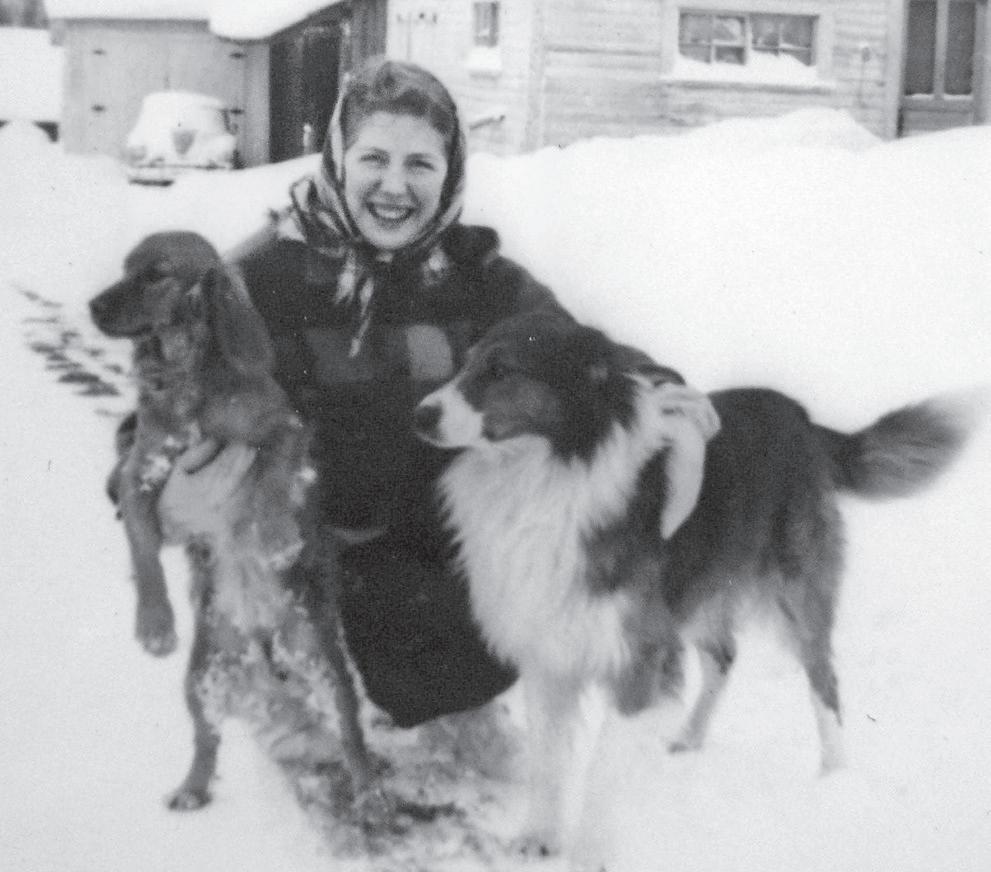

and
Robertson lived on the 30-acre Robertson family homestead on Brown Road. The pictures here showcase winters in the early 1950s. (Photo courtesy Robertson family)
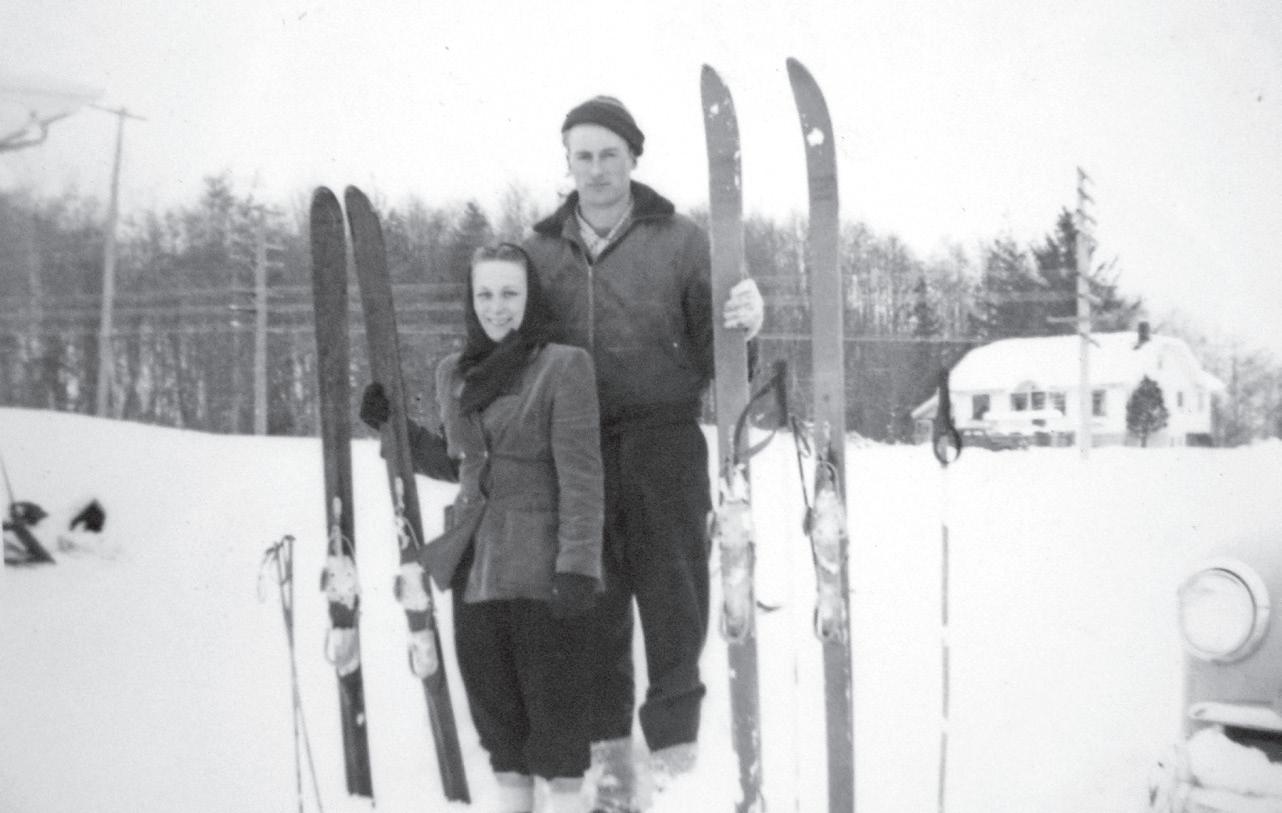
more land for the boys, so they found 10 acres on Mountain View Road.
Nellie said she remembered when she first met Olaf and how he had a car.
“There were still very few cars in these days,” she said of the Chevrolet that Olaf paid $500 for.
Olaf had spent much of his adult life away fishing in Alaska, but according to Nellie he quickly grew tired of that and came back home to settle down and start a farm.
After getting married, Olaf and Nellie lived on a 30-acre farm on Brown Road that homed more than 1,000 chickens.
Nellie said it was 30 acres of timber with a log house and cleared enough for a barn.
“Little by little he cleared more land,” she said.
Doug said his grandfather had two options of land he could purchase. One was cleared and more expensive and the other was considered a stump farm.
“So they became stump farmers,” he said.
It was here on this farm they raised their children, including Olaf Norman, better known as Norm, who was born in 1925 on the farm.
“He was a very big help to his father,” Nellie said.
Norm graduated from Ferndale High School in 1940 at the ripe old age of 16.
Two years later Nellie said the family got their first refrigerator.
“I thought it was just nonsense, a complete waste of money,” she said, adding that Olaf said he wanted it for cold drinks.
Norm was an adventurous soul and worked in the Pehrson sawmill. Although it was owned by her family, Norm later met his wife Doris Pehrson at First Baptist Church.
Doris, born in 1925 to August and Edith Pehrson, was also born and raised in Ferndale and graduated from Ferndale High School. Upon graduation, she went to work at First National Bank as a teller.
Doris and Norm were married in 1948.
Norm lived out his want for adventures first as a commercial fisherman,
Families 2025
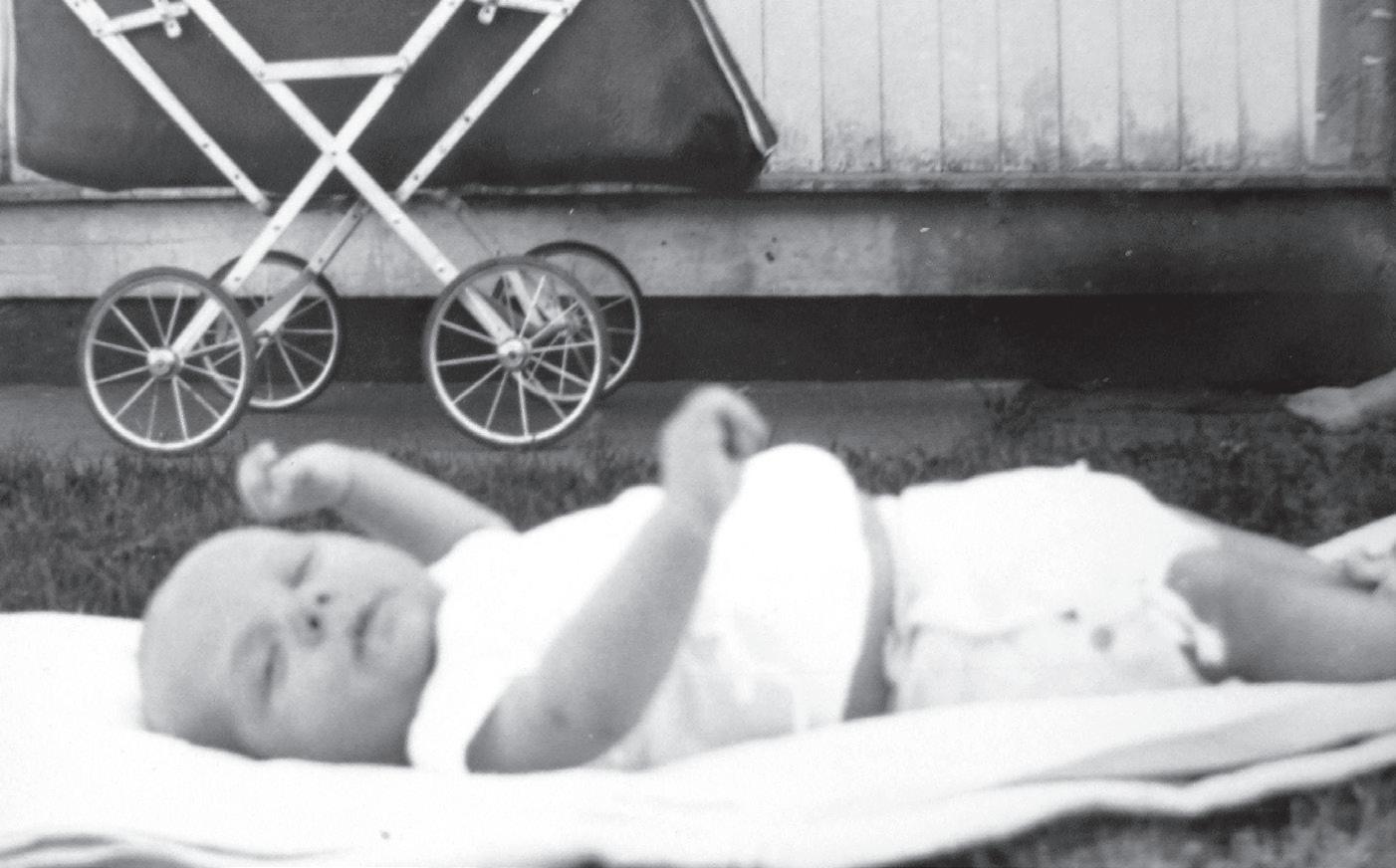
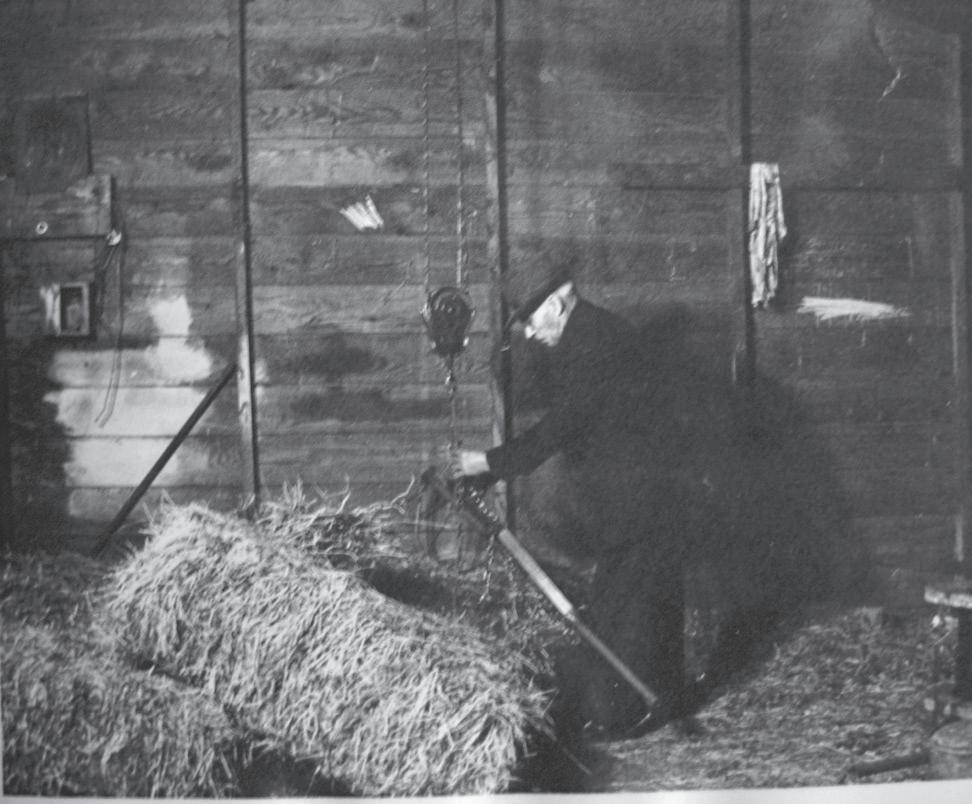

August
was known as quite the inventor and is pictured here with his hay bale lift invention. At bottom: Olaf Krisitian Robertson (right) with his father in 1929. (Photo courtesy Robertson family)
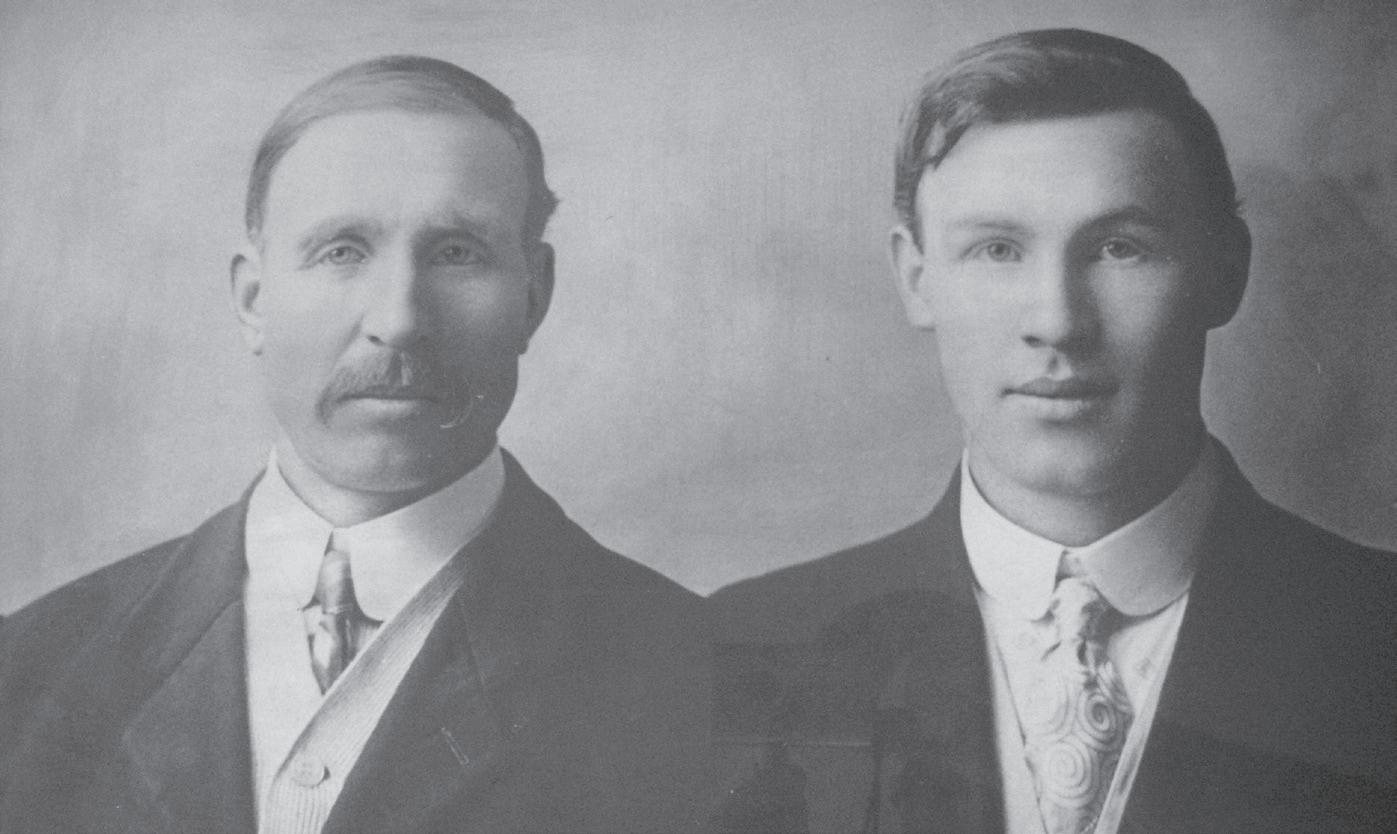

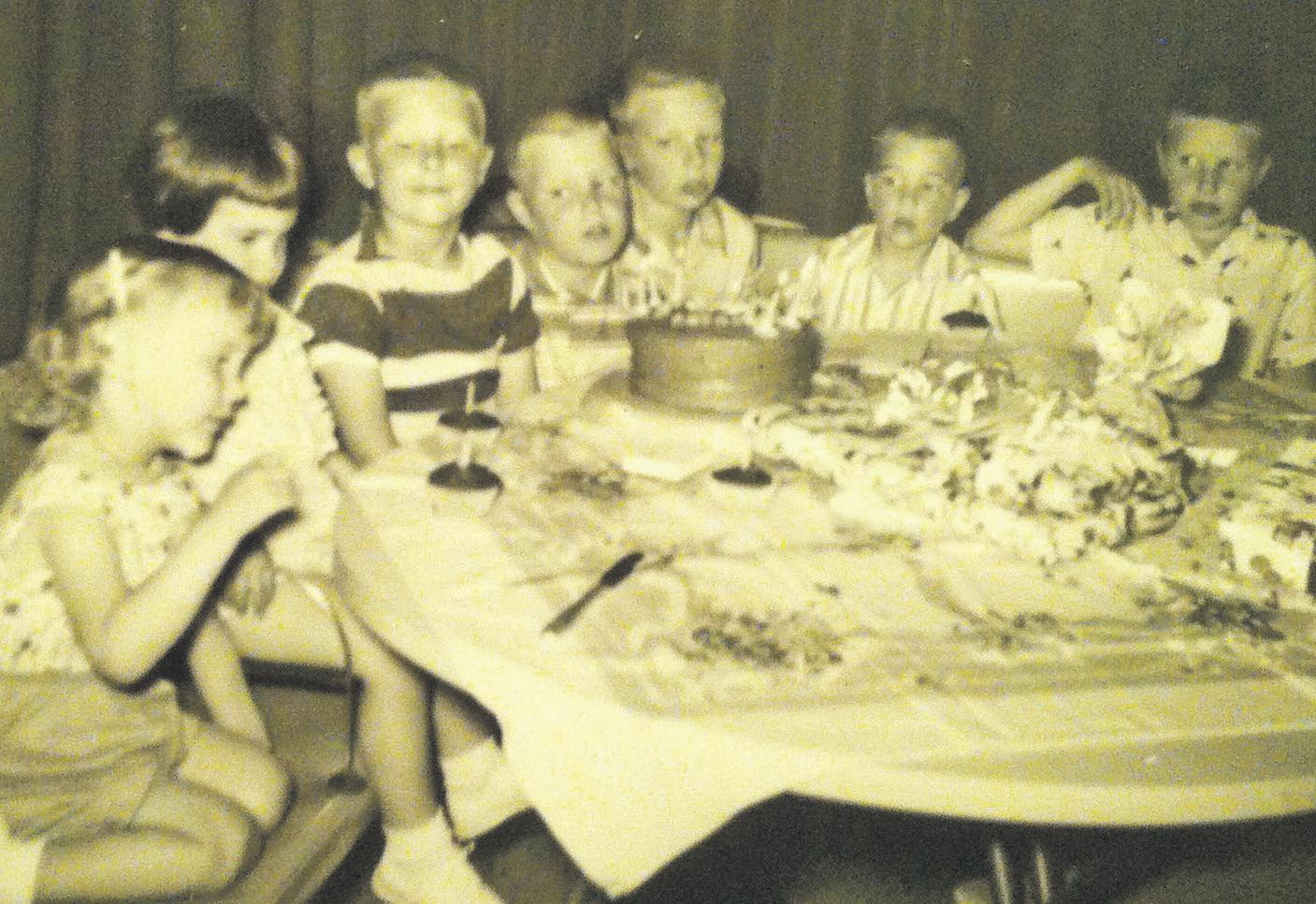
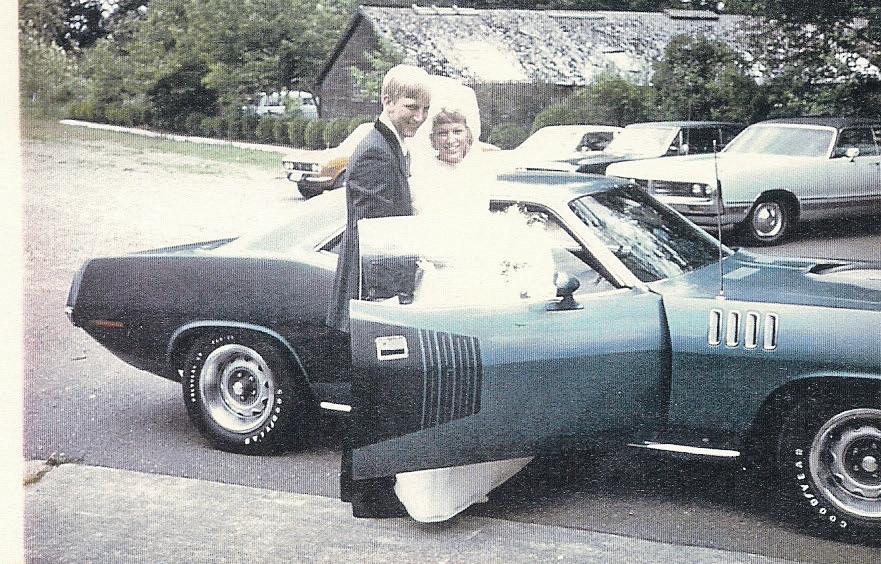
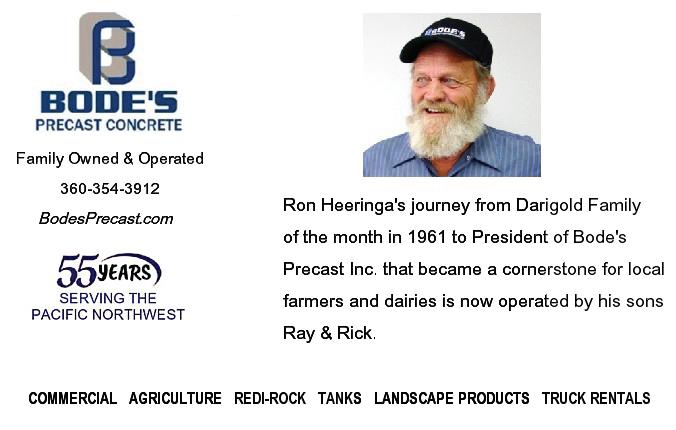
before later finding himself in the logging industry during a logging boom from 1950-1970 and started Robertson Logging.
“That was a really big industry around here,” Doug said as timber was being harvested for railroads.
Doug joined his father in the logging industry, running the family business.
The father-son duo went from the local logging to Prince Wales Island in southeast Alaska where they built logging roads.
“I was his sidekick,” Doug said. “I was a kid in a really dangerous industry.”
Coming back to Ferndale, Doug said Norm was a large part of the community, partaking in everything from teaching a Sunday School class for boys at First Baptist Church to being on the Ferndale City Council and Ferndale School Board.
Doug said he remembers his dad and the community of those days fondly.
“It was a great community and people worked together,” he said. “There were really good times in Ferndale.”
Norm was seriously injured in a car accident in 1985 and passed away in 2014 and Doris followed in 2022.
Prior to his passing, Doug said he took his father back to Prince of Wales to see the finished logging roads that he was a major part of.
Growing up, Doug said even in his lifetime he has seen Ferndale grow and change.
“It was really small,” he said. “Ferndale itself didn’t even have a stoplight.”
-- Contact Racquel Muncy at racquel@ lyndentribune.com

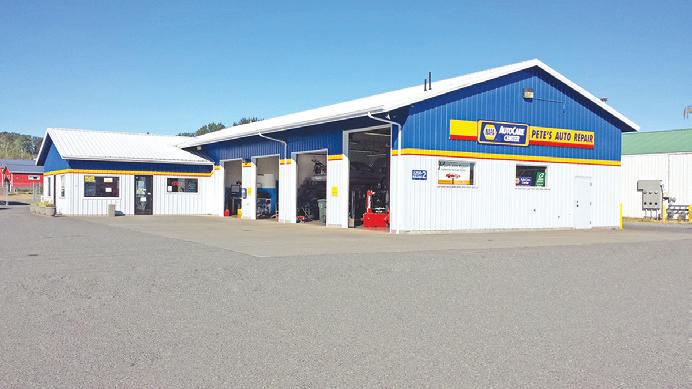

Since 1910 Ebenezer
Christian School
9390 Guide Meridian, Lynden 360-354-2632 www.ebenezerchristianschool.org
Since 1932
8850 Bender Rd. • Lynden 360-354-5988
2417 Meridian St. • Bellingham 360-734-3960

www.westernroof.com 360-734-1830
Since 1952
Hytech Roofing
7381 Guide Meridian Rd., Lynden 360-354-4335
www.hytechroofing.com At Laurel 360-398-2141 Lynden, WA 360-354-3991
Since
3901 Unick Rd. Ferndale, WA 360-384-1011
Since
8353 Guide Meridian Lynden, WA 360-354-5617 Since
Nooksack Ave. Nooksack, WA 360-966-4444
St., Lynden 360-354-2187 alselectricandplumbing.com
6209 Portal Way Bld.2 • Ferndale www.petesautorepair.net 360-380-2277
237 Rosemary Way • Lynden 360-815-0332
1208 Iowa St., Bellingham, WA www.windsorplywood.com 360-676-1025
Since 1970
Bode’s Precast, Inc.
1861 E. Pole Rd., Everson, WA 360-354-3912
Since 1971
DeYoung & Roosma Construction Inc.
141 Wood Creek Dr. • Lynden 360-354-3374
Since 1975
Boice-Raplee-Ross
304 Front St. • Lynden 360-354-4565
Since 1971
Nooksack Valley Disposal
250 Birch Bay-Lynden Rd. • Lynden 360-354-3400
Since 1973
Len Honcoop Gravel, Inc.
8911 Guide Meridian • Lynden 360-354-4763

417 Front St., Lynden Owner: Trey Vogt 360-354-5858 Since

5th Street • Lynden, WA 360-354-1950
Since 2011 EPL Feed LLC
411 West Front Street Sumas, WA 98295 • (800) 821-6288 2098 W. McManamon Rd. Othello, WA 99344 • (800) 572-6454 www.eplfeed.com

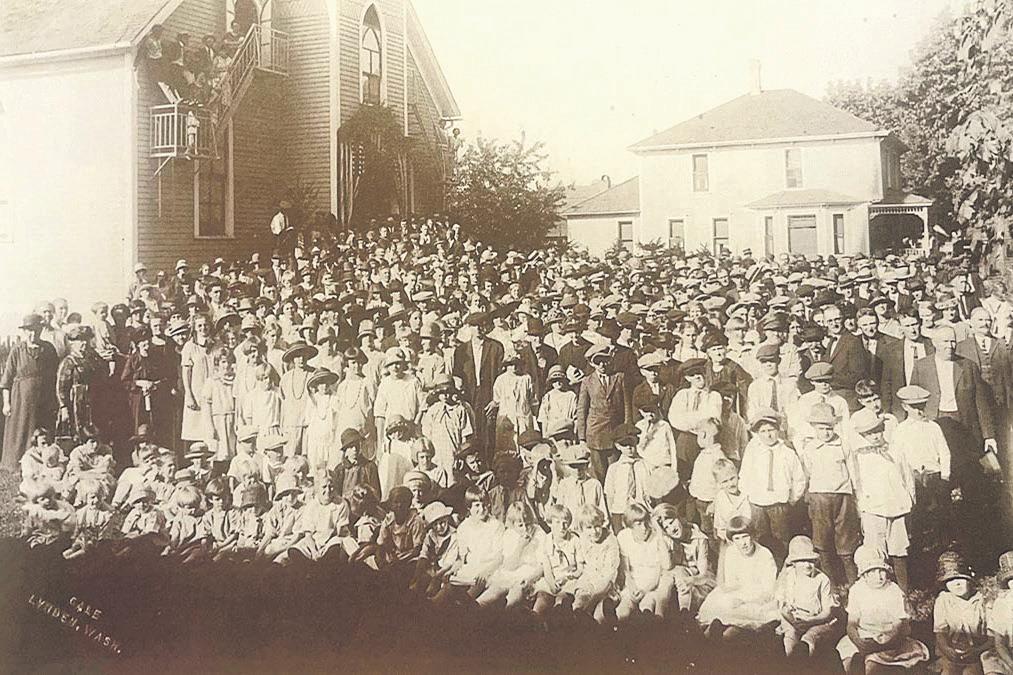
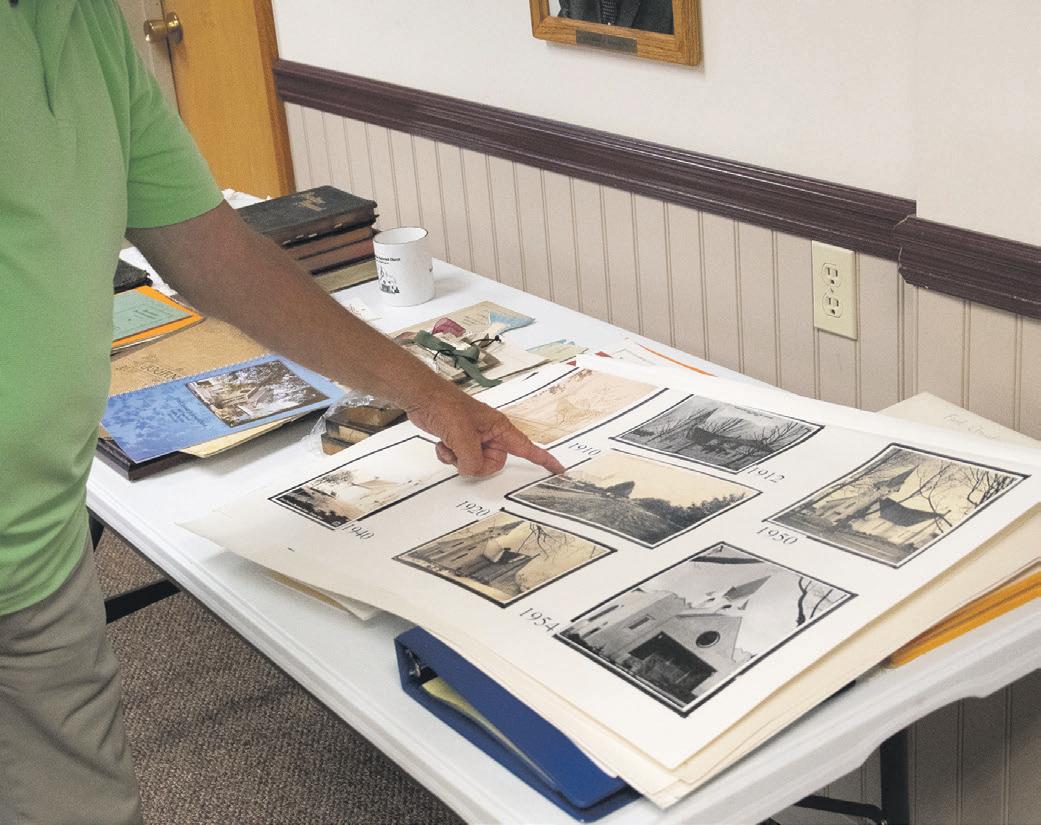
Members of First Christian Reformed Church gather in 1925, above, to mark the congregation’s 25th anniversary. (Photo courtesy of First CRC)
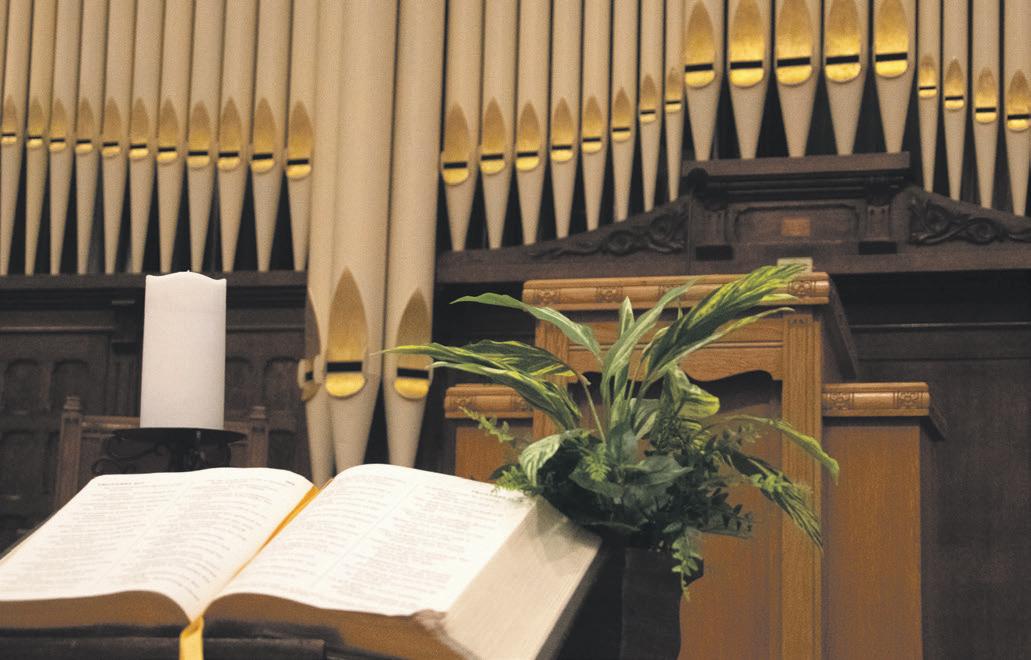
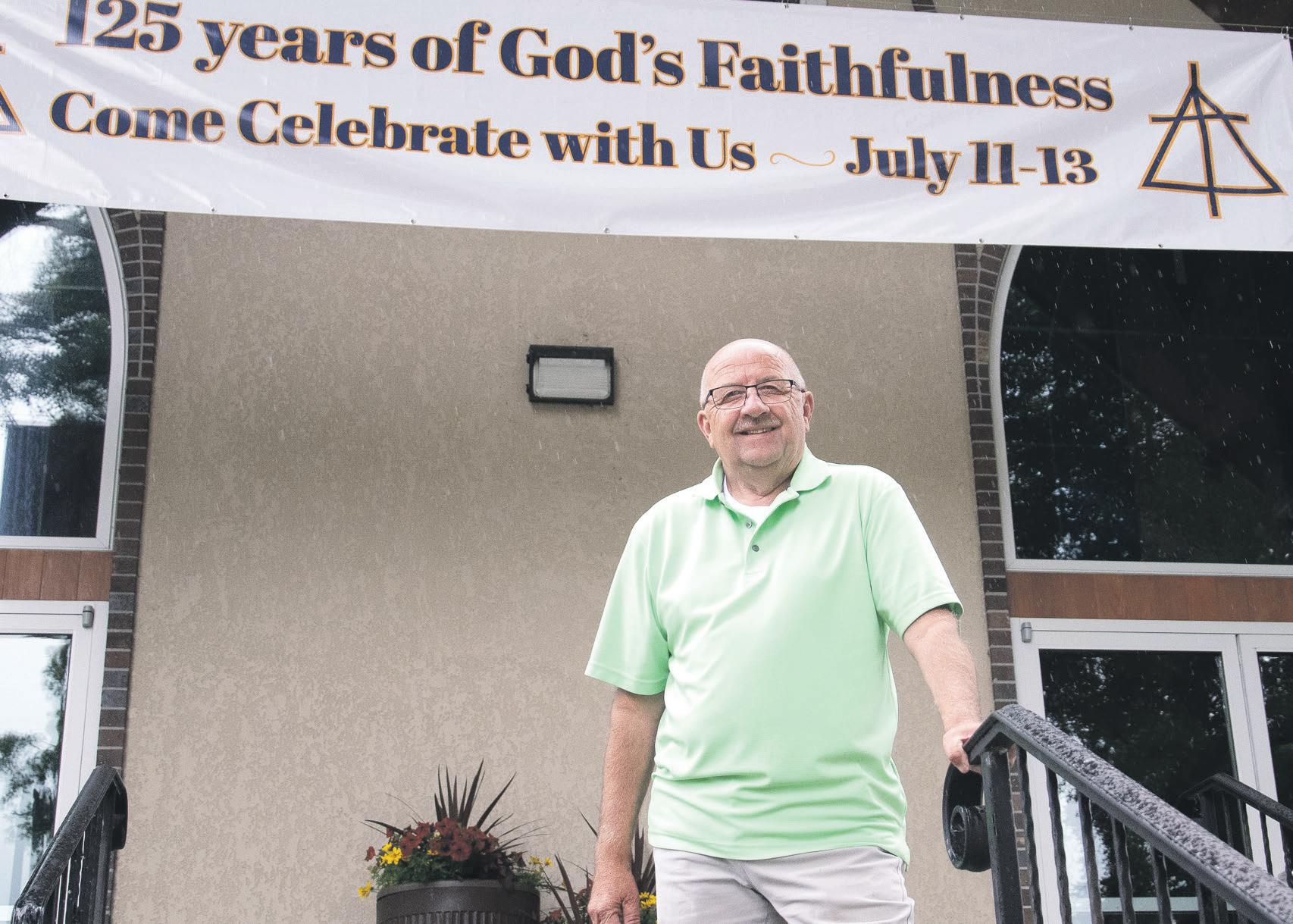
By Joe Kramer Sports Editor
The Rev. Abel J. Brink and his new bride journeyed west in the fall of 1899. Their destination was a small, growing settlement in north Whatcom County. Sent by the Christian Reformed Church’s governing body in Iowa, Brink arrived to establish what would become the first Christian Reformed Church west of the Rockies.
On July 11, 1900, the Holland Christian Reformed Church of Lynden formally organized with 14 families, totaling 59 people.
Today, the congregation, known as First Christian Reformed Church (CRC), prepares to celebrate its 125th anniversary this July with three days of commemorative events.
See First Christian Reformed Church on next page

First Christian Reformed Church in Lynden celebrates its 125th anniversary this summer. Pictured above and on opposite page is Galen Laird, the church’s council president. (Joe Kramer/Lynden Tribune)
“We are most grateful to God for his generous grace for 125 years. This is his church and he has done it,” said Galen Laird, council president of First CRC.
Located at 101 Front St., the church’s physical home has evolved along with its congregation. The current church building was constructed in 1903 and underwent significant remodeling in 1953.
In the past 25 years, further projects have modernized the facility, including a new, spacious narthex, gathering spaces, handicap-accessibility improvements with the installation of an elevator, expanded office areas for staff, a library, a loft for social gatherings and youth activities and additional basement storage.
“Since we celebrated our centennial 25 years ago in 2000, much has changed in our facilities,” Laird said.
Beyond bricks and mortar, First CRC’s influence has long extended into the fabric of Lynden and surrounding communities.
“The elders of First CRC founded Lynden Christian School and Ebenezer Christian School in 1910,” Laird said. “First CRC elders made up the first boards of the two schools.”
Throughout its history,
the congregation has helped establish several other Christian Reformed churches in the region, a process often spurred by the practical needs of a growing membership and changing cultural tides.
The church’s first 20 years of worship were primarily conducted in Dutch, a reflection of its members’ immigrant roots. But after World War I, increasing demand for English-language services led to the creation of Second Christian Reformed Church in 1920 and Third Christian Reformed Church in 1938, the latter consisting mostly of younger families who worshipped entirely in English. First CRC held its last Dutch service in 1953.
“Language lay behind the formation of the Second and Third Christian Reformed Churches,” Laird said. “But other daughter churches have grown out of First Christian Reformed for other reasons.”
Beyond Second and Third CRC, other congregations organized by members leaving First CRC include Bethel CRC, Everson CRC, Bellingham CRC and Sumas CRC.
Throughout the decades, First CRC members have played significant roles in local institutions and services, reflecting the church’s motto, “A Church that Cares.”
“In the early 1950s, First
CRC elders and members helped establish Wiser Lake Chapel,” Laird said. “In 1956, First CRC elders and church leaders were part of establishing the Christian Health Care Center on BC Avenue. In 1969, First CRC was instrumental in founding the Christian Hope Association. Our members over the decades have built businesses and have served on numerous boards.”
The congregation has also been active in missions and outreach both locally and globally. Under the leadership of Pastor Robert Woodyard, who was called to serve the church 18 years ago and is now its longest-serving pastor, First CRC expanded its missions emphasis.
Teams from First CRC have traveled to Papua New Guinea, Zaventem, Belgium, New Delhi, India, Toronto, Canada, orphanages in Mexico and the JAARS headquarters in North Carolina. Closer to home, church members participate in SERVE projects and in “Rock the Block,” a summer Bible school joint venture involving local churches.
“We are a church of volunteers,” Laird said. “Hundreds of people volunteer in myriads of tasks necessary for the full ministry of the church.”
The church has also navigated significant societal and cultural changes. One of the
biggest in recent memory was the COVID-19 pandemic, which forced sudden shifts in worship practices.
“In the past decade, no doubt our greatest challenge, like many churches, was navigating our way through the COVID crisis,” Laird said. “We had to adapt quickly, get up to speed with technology and figure out how to comply with ever-changing mandates. By God’s grace we managed to hold together.”
During the height of the pandemic, the state of Washington prohibited in-person worship gatherings, and First CRC transitioned to livestreamed services. When restrictions eased, the church held duplicate services to allow smaller groups to attend while maintaining social distancing. Wearing masks became a point of tension for some congregants, Laird said. “Some refused to wear them while others thought everyone ought to wear one,” he said. “At this time, we had a few families leave the church because they thought we were too restrictive in our mask wearing and seating policies. Meanwhile, others left because they thought the church was not restrictive enough in stopping the spread of the virus.”
The church’s services and culture have changed in other




ways over the decades. Once, attending church was a formal occasion where men wore suits and ties and women wore dresses, and conversation before services was minimal.
“As times changed and our culture became more casual, so did our worship services and the way we dressed to come to church,” read a church anniversary publication. “I still remember a young man who broke the unwritten code of church wear by coming to church wearing a pair of shorts on a warm Sunday morning. Ties on men are few and far between. There’s hardly a young man today that knows how to tie a Windsor knot in a tie.”
Music has similarly evolved. While organ music once dominated services, modern worship now includes a music team with drums, stringed instruments, trumpets and song leaders teaching new songs.
“We continue to have traditional worship services using the format of years gone by. Today our musical repertoire goes beyond the church organ as accompaniment to music,” the publication noted.
The July 11-13 anniversary celebration aimed to bridge generations and commemorate the church’s past, present and future.
Events began July 11 with a special program featuring guest speakers, music, videos and memories, including remarks from denominational guest Jon Hoekema, Lynden Mayor Scott Korthuis and others. The evening concluded with an ice-cream float social.
On July 12, the church held an open house with tours of the facility and an organ presentation led by Shawn
Support your community. Shop our local business.
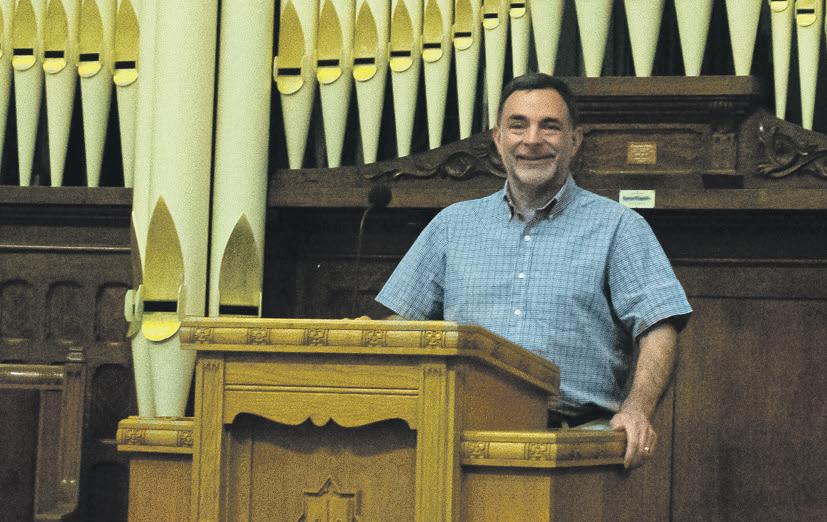
VanDyken.
Festivities culminated on July 13, with morning and evening worship services, reflections from denominational representative Jeff Bolt and leadership from Pastor Woodyard. Following the morning service, a church-wide lunch and games for children were held.
“Our theme is, ‘One Generation Will Call to the Next,’” Laird said. “May it be known in Lynden and beyond that the mission of First Christian Reformed Church is to pass on and spread a passion for the glory of God from generation to generation so that all who follow us will find us faithful and that all who follow will themselves be faithful to Jesus Christ, that they will set their affections
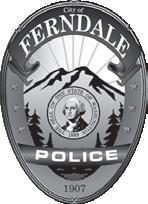

and hope in God, will remember always the gloriously redemptive works of God and obey all His Word by the power of the Holy Spirit.”
Looking ahead, Laird shared his hope for the church’s next century and beyond.
“That we would continue to grow in our knowledge and love of Jesus and continue to faithfully and fruitfully proclaim God’s Word in our community for his glory.”
The 125th anniversary events at First Christian Reformed Church reflected not only a significant milestone for the congregation but also its continuing presence as one of the oldest faith communities in north Whatcom County.
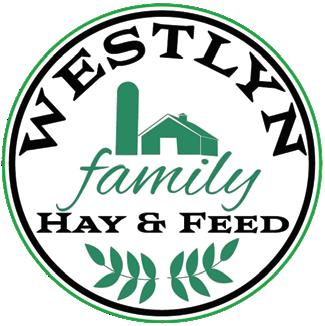

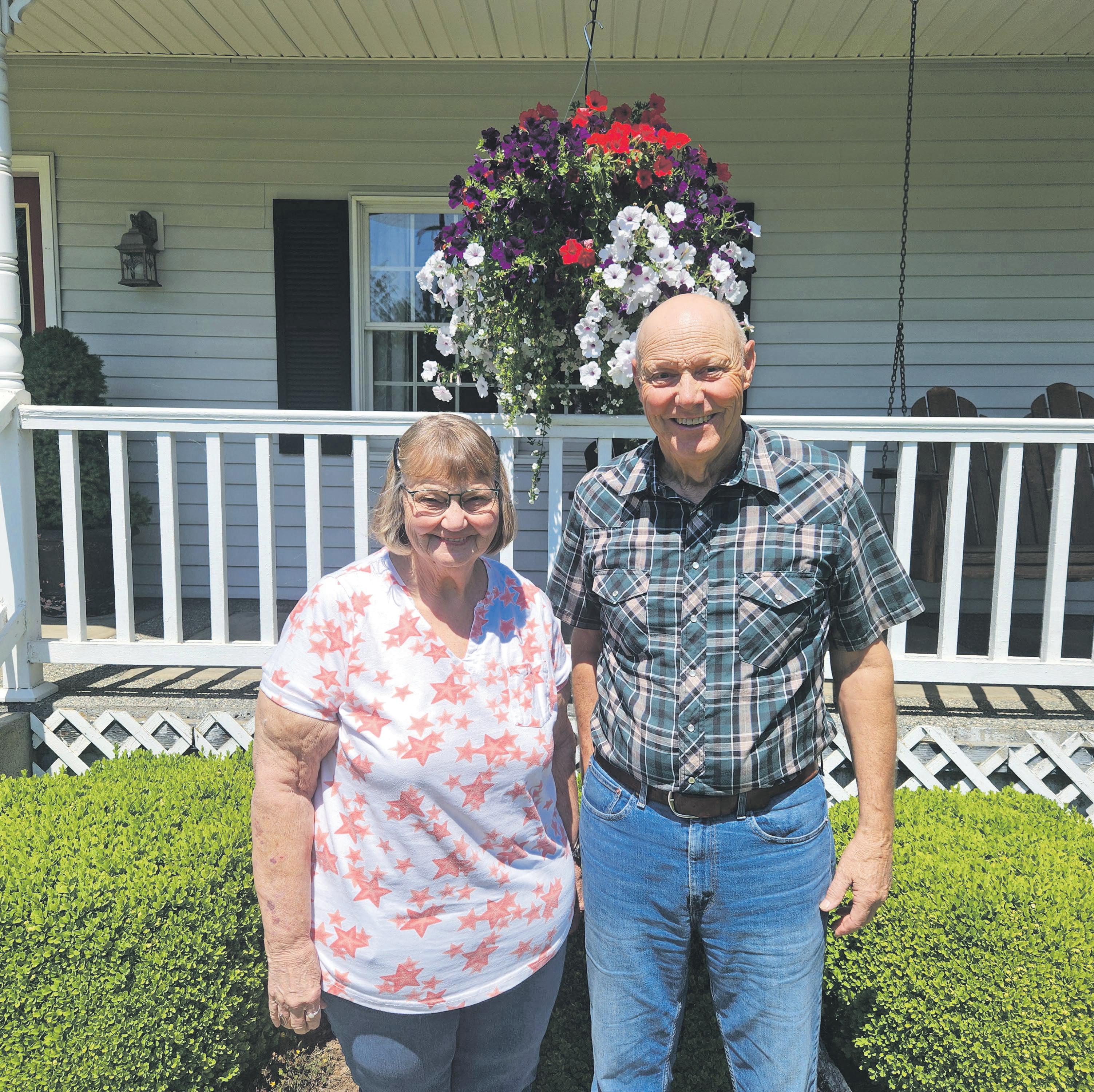

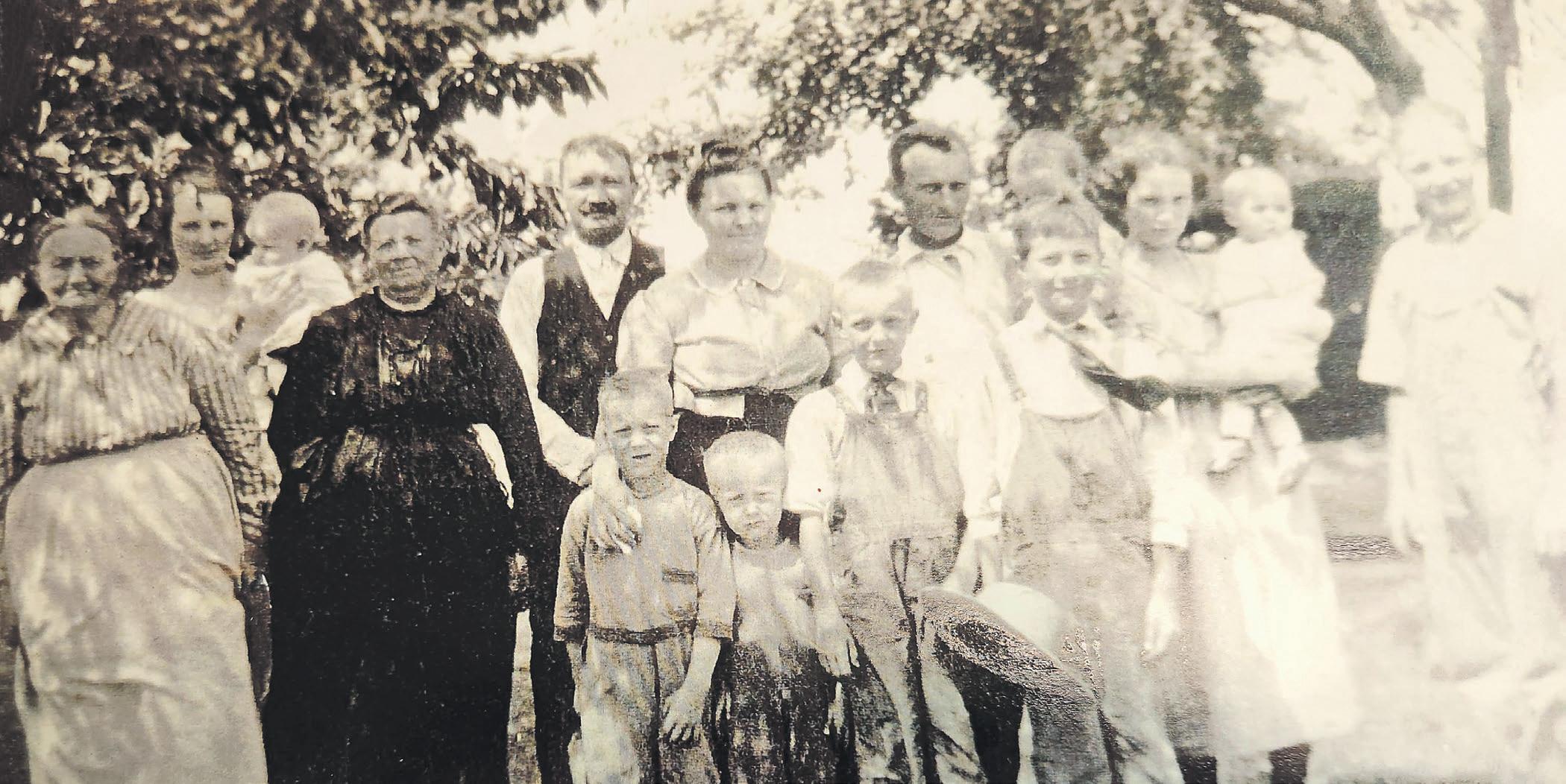
Tom and Ziena Heeringa in 1924 or 1925 with family. Tom met his future wife Ziena (Gesiena) Assink during a sightseeing trip and by September 1901 they were married and moved into Lynden. It didn’t take long for the couple to save their money and purchase a 35-acre piece of land. What now looks like a vast expanse of farmland was covered in trees when Tom purchased it. Over time he cleared it and built a house. (Photo courtesy Heeringa family)
By Racquel Muncy Staff Reporter
These days sending a 13-year-old off to a new country by themself would seem outlandish, but that is exactly what happened to Thomas (Tjipke) Heeringa.
Known as Tom, the boy was the youngest of five born to Pieter and Sytske in September 1878 in Tzummarum, Friesland. Pieter had died and Sytske got remarried to his brother, whose wife had died during childbirth.
With his other siblings already in America, Sytske sent Tom to the states by boat.
“Things were pretty difficult for them in Holland,” Randy Heeringa, great-grandchild of Tom, said. “It was a different time and a different era.”
Jill Yonkman, great-grandchild of Tom, said her grandpa Pete told her a story that he had heard from Tom. The story goes that when Tom finally arrived in America those checking in the incoming immigrants said he was too young and were going to send him back home.
While waiting, Tom pulled out his pipe and when he was seen smoking he was told that if he was man enough to smoke a pipe he was man enough to stay in America.
From the ship, Tom found a train to Iowa where his siblings were living.
Upon his arrival, Tom had to find a sponsor, but he was one of many Dutchman coming to the area and many families were already sponsoring someone. He found a farmer
See Heeringa on next page

with three daughters who needed help around the farm, according to Randy.
“I remember dad telling me that story,” Randy said.
The following year his mother and stepfather also moved to Iowa from the Netherlands.
It was in Iowa that Tom finished his education, going to school in the winter and working as a farmhand throughout the rest of the year.
Tom stayed in Iowa with his siblings until he turned 21. Seeking a little more adventure, he traveled by stagecoach to Lynden with his best friend Sam Bajema. They left the day after Christmas and arrived five days later in 1899.
A July 1955 article in Darigold Digest refers to the venture as a sightseeing trip. The duo must have liked what they saw because they decided to test the waters for a year before putting down roots.
“They thought they would come check it out and I don’t think they ever left,” Randy said.
That first winter Tom and Sam rented a cabin where Homestead now is, according to Rose Scheffer, another greatgrandchild of Tom’s.
Tom and Sam found work where they could, testing the waters in a sawmill, making shingle bolts and various odd jobs before settling on farming.
Tom met his future wife Ziena (Gesiena) Assink early on in this sightseeing trip and by September 1901 they were married and moved into Lynden. It didn’t take long for the couple to save their money and purchase a 35-acre piece of land. What now looks like a vast expanse of farmland was covered in trees when Tom purchased it. Over time he cleared it and built a house.
“It wasn’t much to look at, but it was our very own,” Ziena said in the 1955 Darigold article.
Over the years the land cleared and the family grew to include nine children. By 1903, Tom had bought his first cow and became one of the first dairy shippers with Darigold.
Jill said Tom’s shipper number was 20, as seen on his milk cans.
Dairy became a family affair and later the Heeringa boys would have number 61 and 62, according to Jill.
Fast forward to 1930 and Tom and Ziena had decided they needed more land to grow and split among the six boys.
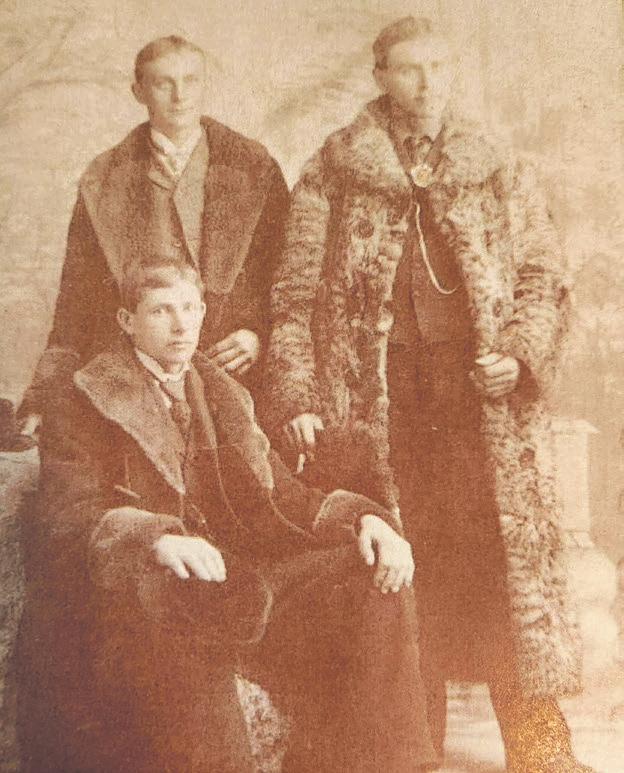
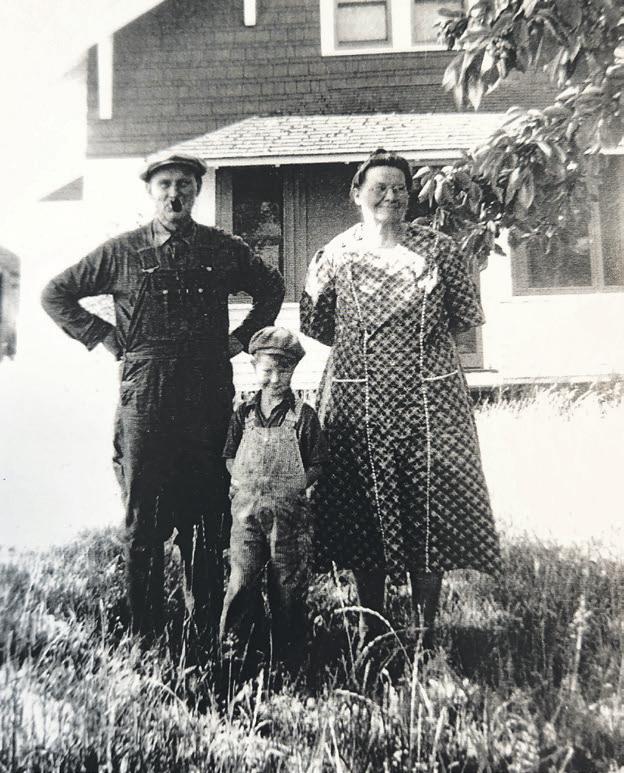
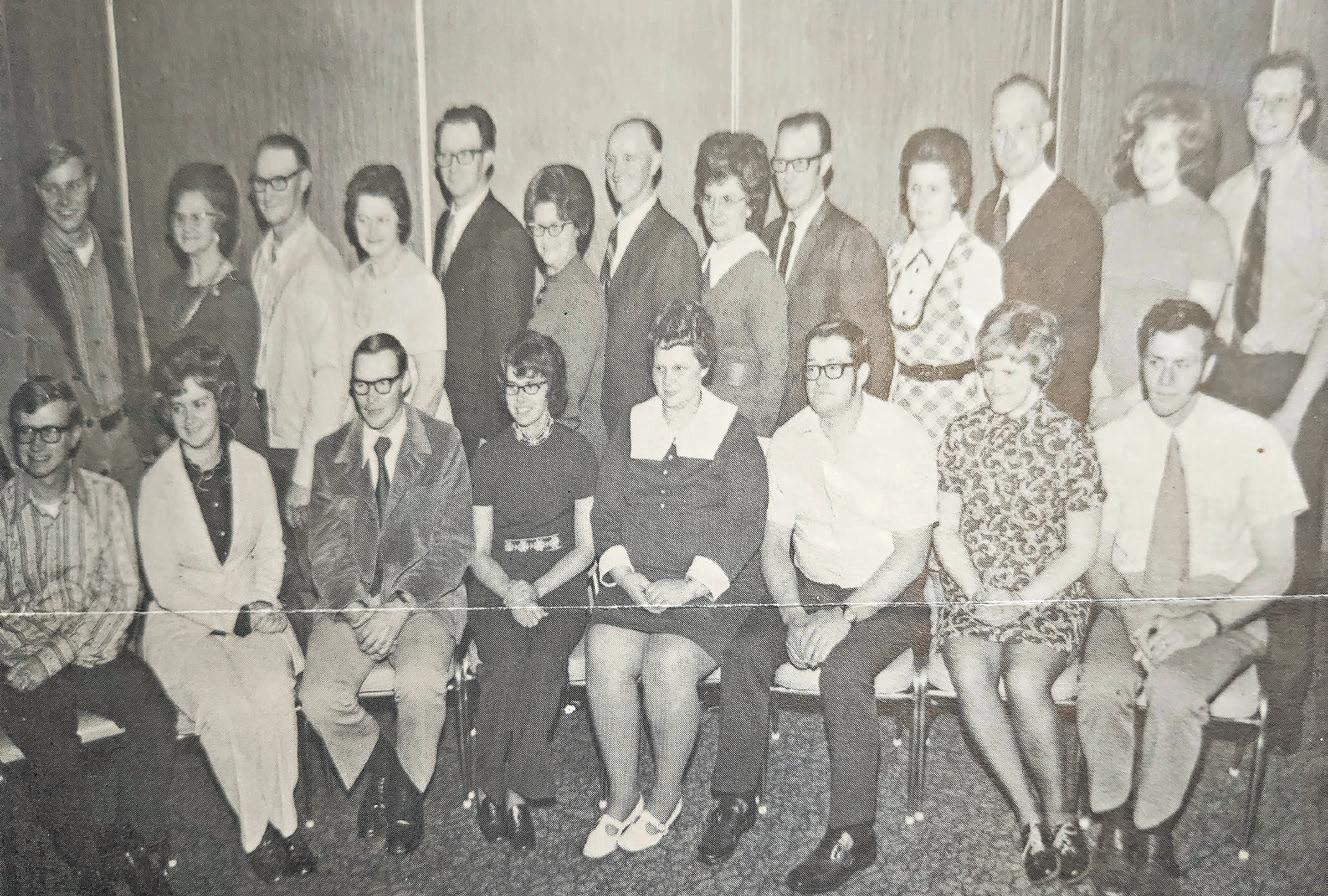
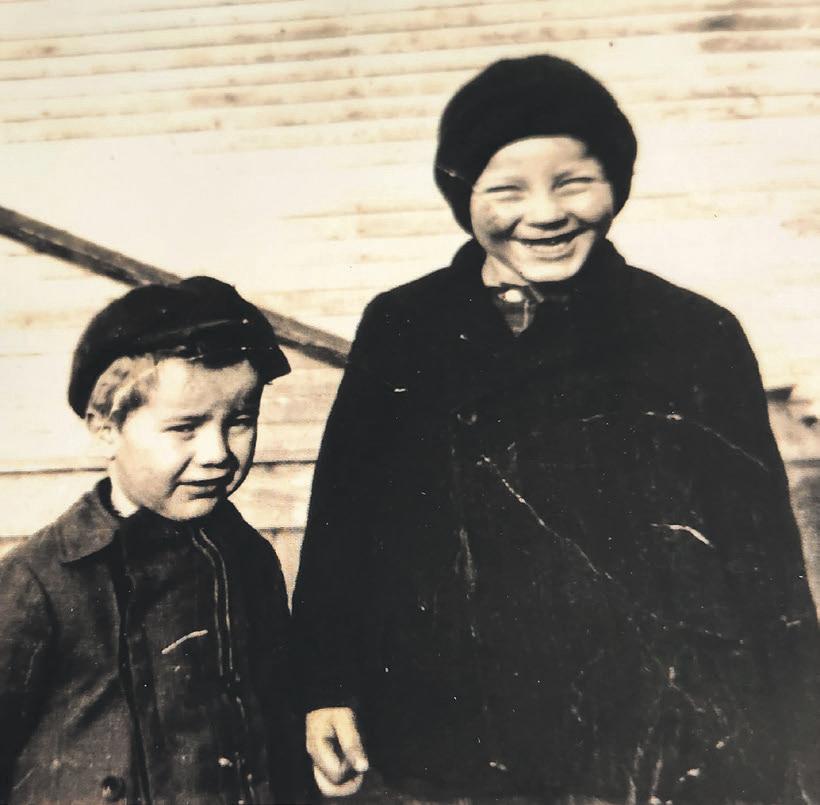
Tom Heeringa and Sam Bajema, featured standing in top left, ventured to Lynden in 1899 on a “sightseeing trip”. It was here Tom started a family with Ziena (top right) and raised their family. That family (middle photo) all ended up in the dairy business and became some of the earliest members of Darigold. (Photo courtesy Robertson family)
It was then they bought 160 acres along Blaine-Sumas Road, which is now known as Badger Road.
“Grandpa helped them all get started with either money or land, but they were required to pay it back,” Randy said.
Rose said the whole family ended up living within about one mile from the home farm and nearly a century later much of the land is still lived on by close family.
“That’s where we all grew up,” Rose said.
According to the Darigold article, Tom retired in 1946 and divided the now 66 cows equally among his six sons. “Tom Heeringa is truly a Darigold pioneer, not only in years but also in spirit,” the article states.
He was also a pillar of the early Lynden community, sitting on the first Lynden Christian School Board.
Tom also left a legacy of contentment and was often pictured smiling.
While Jill said she has heard about how friendly Tom was, it was also written into history by Lottie Roeder Roth in 1926 in “The History of Whatcom County, Volume II.”
“He is keenly alive to everything affecting the welfare or progress of his community,” she wrote. “Genial and companionable, he enjoys a wide acquaintance throughout this section of the county and has a large circle of warm and loyal friends, who esteem him for his genuine worth as a man and citizen.”
Tom passed away in 1966 and is buried in Monumenta Cemetery.
-- Contact Racquel Muncy at racquel@lyndentribune.com
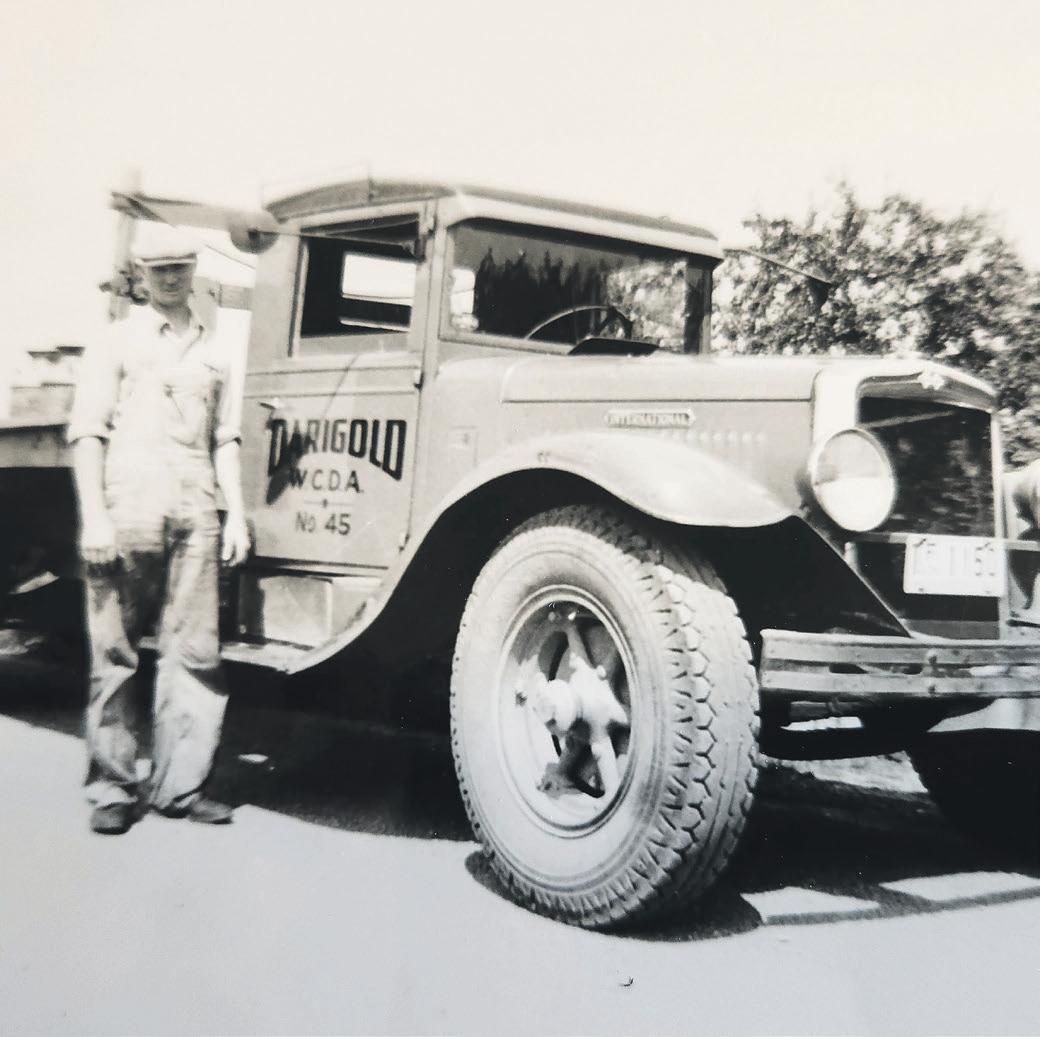


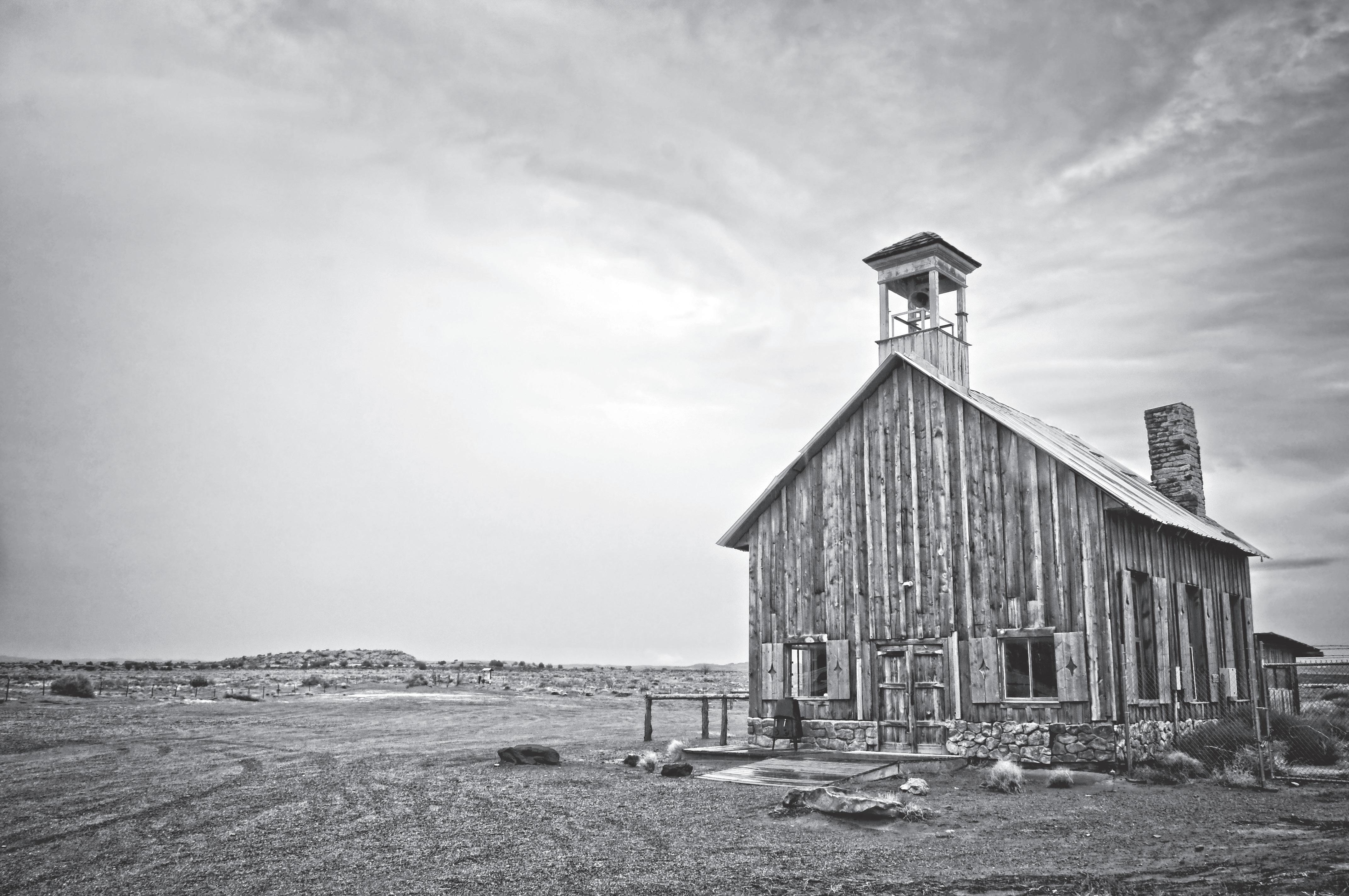
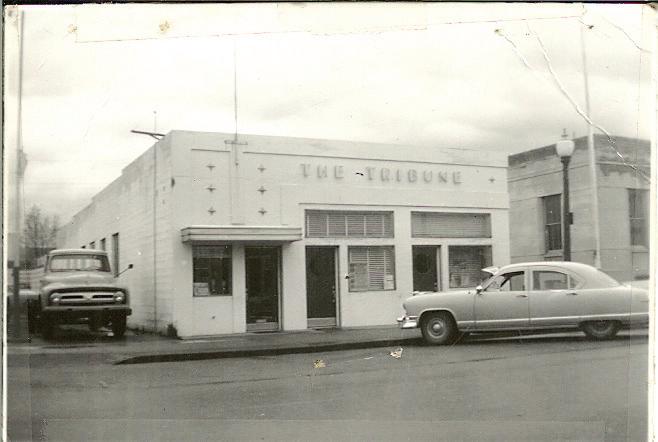


By Lynda Lucas For the Tribune
WHATCOM— With deep respect and heartfelt appreciation, the Whatcom County Old Settlers Association has named Jacelyn Jodock King as the grand marshal of the 2025 Pioneer Days Parade.
This year’s parade will take place on Saturday, July 26.
Jacelyn’s lifelong dedication to her community, extraordinary volunteer spirit and unwavering support of the Old Settlers Association make her the perfect honoree for this year’s celebration.
Jacelyn’s journey with the Old Settlers began on Aug. 9, 1989, when she officially joined the association.
In the 36 years since, she has become one of its most vital and inspiring members.
From serving as treasurer and vendor chairwoman to organizing and leading the much-loved free children’s activity area, Jacelyn has devoted countless hours to ensuring each Old Settlers celebration is meaningful, inclusive and fun for all ages.
Her energy is boundless, her commitment unmatched, and her passion for community unmistakable.
Whatcom County Old Settlers Association has named Jacelyn Jodock King as the grand marshal of the 2025 Pioneer Days Parade. (Photo courtesy Whatcom County Old Settlers Association) OLD
Following in the footsteps of her father, Norman Jodock, who served as the association’s president from 1972–1973, Jacelyn has carried forward a family legacy rooted in community service.
But her ties to the park and Pioneer Days run even deeper.
As a child, she played on
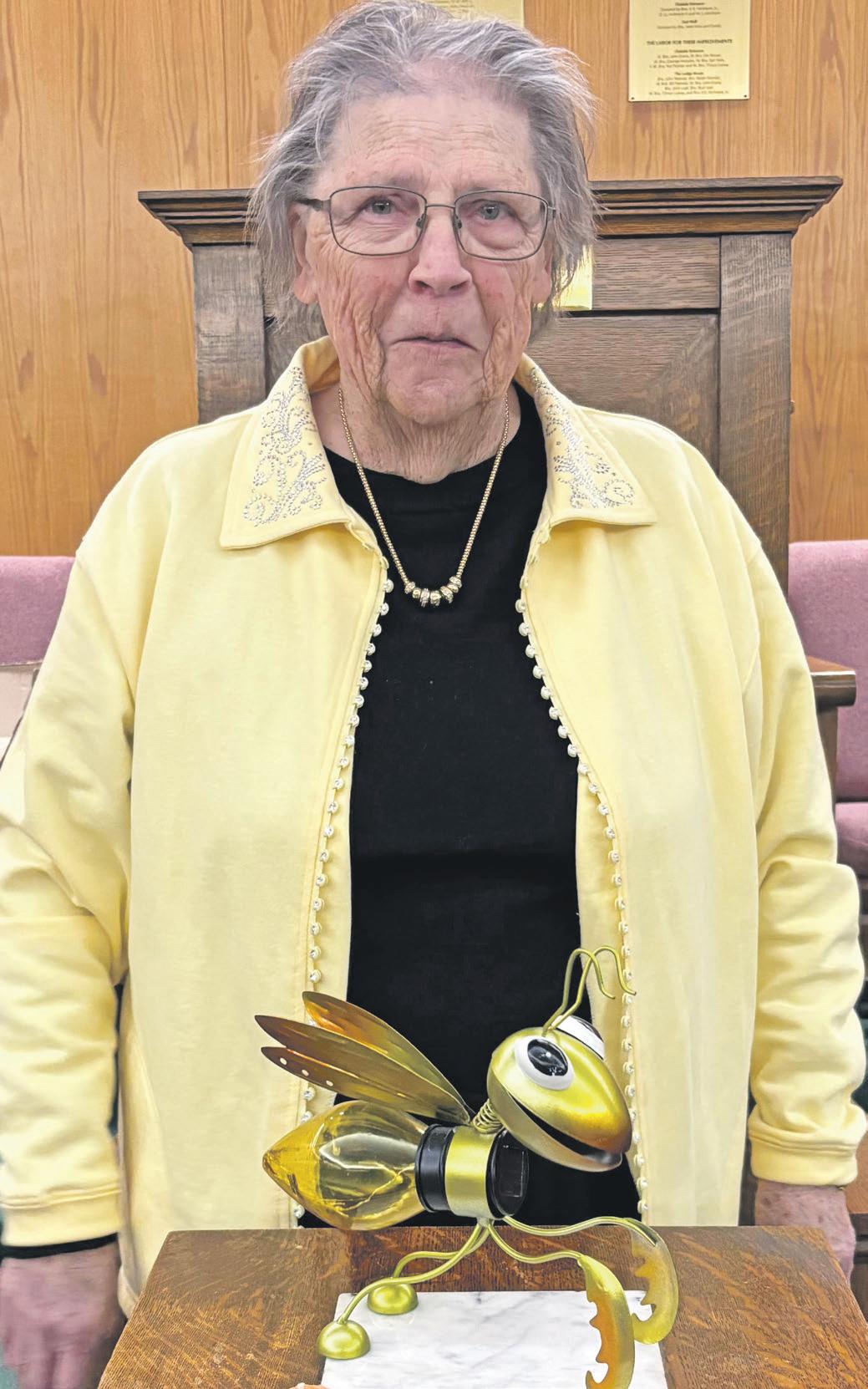
the Merry-Go-Round and flying rings that once stood on the east side of Pioneer Park, long before the iconic circle of log cabins took shape.
Ferndale has always been
home to Jacelyn. She was born in Whatcom County, attended Ferndale Schools and graduated from Ferndale High School in 1960.
In 1961, she began her
work with the Ferndale School District, as she was hired for her outstanding spelling skills at a time when the district had a pressing need.
In 1963, she married Laverne King, and together they raised five children.
Even before her formal membership with the association, Jacelyn could be found volunteering at the park, serving in an advisory role for the Rainbow booth and observing the strong family bonds among longtime Old Settlers.
These early memories deeply influenced her, shaping the generous, hands-on leader she would become within the organization.
Jacelyn once said, “Ferndale is my home, and I’ve seen many changes over the years — so I know what old people feel like, with memories of the past,” she said. “That’s what the Old Settlers are all about — old memories and making new ones.”
As we celebrate our 129th Pioneer Days, we invite the community to join us in honoring Jacelyn Jodock King — whose heart, heritage and hard work embody the very spirit of the Old Settlers. Be sure to wave and cheer as she leads this year’s parade. And if you get the chance, stop by and say hello — she’ll be the first to remind you that she’s proud to say, “I am an old settler.”
-- Lynda Lucas is president of the Whatcom County Old Settlers Association

